

Travel and Reimbursements

UCLA Travel Arrangements
- VC Research Travel and Working Meeting Guidelines
Direct Payment
Travel reimbursements, reimbursable expenses, working meetings, non-reimbursable expenses, travel insurance, other reimbursements, foreign travel, useful travel links.

- Travel and Other Reimbursement Request Form
- Travel and Other Reimbursement Request Form Instructions
- Working Business Meeting Expense Form
UCLA Travel
Phone: (310) 206-2639, (800) 235-UCLA (8252) Email: travel@finance.ucla.edu Website: UCLA Travel Services
ORA Contact
Aiza Almario (310) 206-3368 Allynn Lewis (424) 259-5039
Online booking is available through the Concur portal using your UCLA Log-On ID (Single sign-on). Please contact Allynn Lewis for instructions to update your profile in the portal. Please allow at least 2 weeks advance notice prior to your travel date to process airfare booking.
Concur is a secure, web portal with access to UC’s Systemwide Travel Program comprehensive rates and benefits for all those affiliated with UC. It is important to note, we can only do direct billing for airfare; however, Concur can also be used to book all your other travel needs (lodging, car rentals, rail).
For additional information, please refer to the following link:
- Guidelines for Infrequent Travelers
It is the policy of the University that all business travel shall be properly authorized, reported, and reimbursed in accordance with UC policy. Under no circumstances shall personal expenses be charged to, or be temporarily funded by, the University, including UCLA Corporate Card.
For additional information, please refer to the following links:
- UCLA Travel Guidelines
The following can be paid directly by UCLA to minimize employee out of pocket expenses:
- Conference Registration (3 weeks advance notice)
Contact Allynn Lewis with any request and questions.
Travel & Entertainment (T&E) Card
With the approval of the individual’s director, ORA staff that travel on University business or for professional development at least four (4) times a year are eligible for UCLA’s T&E card.
The Travel & Entertainment (T&E) card is intended to cover most business travel related expenses, including lodging, food and transportation.
- Cardholder is personally responsible to pay balance due on time.
- T & E Card can only be used for travel and entertainment expenses that are related to University business and reimbursable under University policies. No personal expenses are allowed.
- Travel-related expenses, such as hotel deposits and conference registration, can be reimbursed in advance if they are purchased using the T&E card.
- Please submit approved requests to the business office within five (5) days after returning from travel or event.
- Late fees are not reimbursable, per University policy.
- Please visit the Travel & Entertainment Card , UC Policy and T&E Coverage & Use websites for additional information.
- Please see the T&E Cardholder Agreement with US Bank.
Please contact Aiza Almario with questions and completed application .
- Travel of Less than 24 Hours – When the entire length of a trip is less than 24 hours, meals and incidental expenses cannot be reimbursed unless the travel includes an "overnight stay” as supported by a lodging receipt.
- Per University Policy, Travel reimbursement must be completed by UCLA's Travel Accounting within 45 days from completion of trip or it will be treated as imputed income and taxable.
In order to claim reimbursement for your travel expenses, you must complete the Travel and Other Reimbursement Request ( Form , Instructions ) and submit the completed form along with the original itemized receipts to Allynn Lewis within 5 business days of the end of a trip.
- It typically takes 5 to 12 working days for UCLA Travel Accounting to process the reimbursement check and electronic deposit to the traveler’s bank.
Please refer to the following policy if there are any additional questions:
- Travel Policy
- Travel and Other Reimbursement Request ( Form , Instructions )
- Expenditures for Business Meetings, Entertainment, and Other Occasions. BUS-79
- Direct billing of airline ticket is strongly recommended. Refer to Travel Arrangements for details.
- For reimbursement of airfare, the original receipt for the ticket is required. If traveling with an e-ticket, the email receipt/confirmation with proof of payment will suffice. All flight receipts/documentation must include the form of payment (e.g., if the airfare was paid with a credit card, it may include VISAxxxxxxxx1234).
- Travel packages that are not itemized will not be reimbursed (i.e. Expedia, Orbits, Travelocity) as they do not provide itemized receipts/folio as required by IRS regulations.
Please use UCLA's preferred car rental company (currently Hertz, National, and Enterprise) according to University policy. Please refer to the University’s Rental Car Agreements for additional information.
- Do not take the additional collision damage waiver (CDW), as the UCLA negotiated rate includes this coverage.
- Any additional insurance purchased is not reimbursable and will be at the cost of the traveler.
LAX offers parking discounts for UCLA employees through The Parking Spot, UCLA’s preferred partner. You will save 25% off the regular rates by showing your UCLA University ID.
Effective October 15, 2017, the following limit will be in effect for all Continental US travel: Continental US (CONUS) Lodging Expense NEW CAP of $275 nightly rate
- If the traveler is unable to secure lodging at $275 per night or less, the traveler must submit additional documentation such as price comparisons within reasonable proximity of the meeting location. The price comparisons should be performed at the time of booking.
- A traveler who is required to attend a conference where the prearranged conference lodging rate exceeds the $275 per night cap may stay at the conference hotel without exceptional approval.
Original, itemized receipts for all lodging expenses as well as any working meeting expenditures included in the lodging claim are required for reimbursement.
Lodging is generally not reimbursable if the lodging site is within a 40-mile radius of the traveler's residence.
Exemption from Occupancy Tax in the state of California
As a general rule, University employees traveling on official University business are exempt from payment of occupancy taxes imposed by certain California cities or counties on "transient" (or individual travelers') rental rooms. To avoid misunderstandings, travelers should identify themselves as University employees and claim exemption from the tax when checking into the hotel. However, occupancy tax ordinances in a few California cities do not authorize exemptions for University employees. The traveler may complete an exemption certificate if one is required. The form Transient Occupancy Tax Exemption Certificate for Governmental Agencies is available to be used as appropriate.
Conference Registration
Receipts must have name of the individual, name of the conference, amount paid, and method of payment. If not, please submit credit card statement showing all of the items.
Best practices require original receipts for all expenses because reimbursements are based on actual expenses. Please note maximum meal rate is not a per diem.
The meal and incidental expense maximum is $79/day and there is no exception to the maximum. If meal receipts are lost or unavailable, the traveler may provide their best estimate of the actual meal expense.
When the entire length of a trip is less than 24 hours, (meals for single-day travel will not be reimbursed unless the travel includes an overnight stay that is verified by a lodging receipt.
Expenses for meals incurred by employees who hold working business meetings while traveling on University business are reimbursable in accordance with the University's policy on Expenditures for Business Meetings, Entertainment, and Other Occasions BUS-79 . Working business meetings held while traveling require the same documentation as other business meeting expense.
MAXIMUM RATES FOR MEALS AND LIGHT REFRESHMENTS
Ground transportation
Travelers are required to use the most economical mode (i.e. taxi, shuttle, train, bus) of transportation by the most frequently traveled route. If unsure, please contact Allynn Lewis .
The current mileage reimbursement rate effective is 65.5 cents per mile for use of a personal car on business travel and will be adjusted periodically to reflect increases/decreases in the Internal Revenue Service (IRS) standard mileage rate.
Please note the following:
- Privately owned automobiles may be used if the driver has requisite insurance coverage, Additional Travel Insurance Coverage
- UCLA ORA reimburses the lesser of round-trip airfare or mileage. The amount of the actual mileage or the lowest available airfare, whichever is less, is allowed. No additional reimbursement for automobile-related expenses, such as tolls, ferries, parking, gasoline, etc. will be allowed.
- Mileage claimed to dining venues or restaurants must be within reasonable distance from place of conference or hotel.
- Mileage to local meetings/conferences should be computed between the traveler’s work location and final destination. Mileage may be allowed between the traveler’s residence and destination if the business travel originates or terminates during a regularly scheduled day off.
For addition information, please refer to the “Travel Policy” link under Useful Travel Links .
All other related business expenses, such as baggage fees, internet fees and phone, are reimbursable with receipts. Business justification(s) may be required for certain requests.
How to Claim Reimbursement
Please submit all documents including the completed ORA Working Business Meeting Expense Form and the itemized receipts to Allynn Lewis within 5 business days after the event. All working business meeting expenses must be pre-approved by the director of the individual claiming a reimbursement.
Required Information
- Type of Expense (breakfast, lunch, dinner, refreshment)
- Type of Event (workshop, conference, staff recognition, etc.)
- Purpose of the event or main agenda topic
- Attendee list to include name, title, and affiliation of participants
- Date and location of event
- Name of the official host
Maximum per Person Rates
Meeting facilities on campus.
Business or professional events (room rental, catering, etc.) may be arranged using a pre-approved departmental account number. Please submit a completed ORA Working Business Meeting Expense Form and contact Lupe Romero before finalizing any arrangements.
As outlined by UC Policy G-28, the following list includes a brief summary of non-reimbursable expenses (This list is not all inclusive):
- Airfare issued by non-U.S. carrier
- Any upgrades above coach airfare
- Personal telephone calls
- Third party expenses (e.g., buying ticket and paying hotel/airfare and other expense on behalf of others)
- Out-of-route costs (e.g., a connecting flight/deviation from direct route for a personal business) – reimbursable expenses shall not exceed the cost of hotels, meals, and other expenses that would have been incurred on a direct route to the UCLA business destination.
- Internet package deals – refer to the airfare section for details.
- T&E Card Late Fees are not reimbursable
- Others – any other costs determined to be unreasonable or which are disallowed by University guidelines.
All University travelers are covered worldwide, 24 hours a day, for a variety of accidents and incidents while on business travel status. The coverage includes:
- Accidental death and dismemberment.
- Travel assistance services when the traveler is 100+ miles from his or her home or headquarters, such as emergency medical evacuation, out-of-country medical expenses, loss of personal effects, security extraction and repatriation of remains.
Booking travel through Connexxus automatically enrolls the traveler in the insurance program for travel outside of California; otherwise the traveler must register their trip on the UC Away website before an out-of-state trip occurs. Registration is not required for travel within California as coverage is automatic.
Use of the University's purchasing system is the first choice for direct payment. Use of employee’s personal funds for purchase of goods and services is strongly discouraged. Per LVO Policy 741 , $1,000 is the reimbursement limit for purchases, other than travel, working meetings, & conference registrations.
All documentation (i.e. itinerary , receipts, agenda) related to the trip will be needed to process the reimbursement. Itemized receipts need to be submitted except for hotel and food. Per Diem rates for food and lodging are set according to the country and city of travel. Please complete the Expense Report Form and submit all related expenses to Allynn Lewis .
- Airline Discounts & Contract Rates
- Airport Parking Discounts & Contract Rates
- Expenditures for Business Meetings, Entertainment, and Other Occasions. BUS-79
- Car Rental Contract Rates
- FlyAway Service
- Hotel Discounts & Contract Rates
- Required Reimbursement Documents
- Travel & Entertainment Card (T&E)
- Expense Reimbursement Guidelines
Guidelines for Meals & Entertainment
Business meals and entertainment expenditures in all instances must clearly identify the benefit to the University even when unrestricted funds are being used. University policy requires that documentation for entertainment should include a business purpose, cost, attendees and that itemized receipts be provided for reimbursement.
Business meals and entertainment expenses submitted by campus departments should follow the guiding principles provided in the table below:
10920 Wilshire Blvd., 5th Floor Los Angeles, CA 90024-6541 Mail Code: 143348 Phone: (310) 206-2639 or (800) 235-UCLA (8252)
CST# 2046415-70
Travel Services Directory
© 2024 Regents of the University of California
- Accessibility
- Report Misconduct
- Privacy & Terms of Use
Commuting and Travel

All transit agencies in Southern California are following CDC guidance on sanitizing, ventilation and passenger density. There have been no known clusters of COVID-19 virus transmission on bus or rail systems in the United States. Public transit is encouraged; it continues to offer a stress-free way to get to campus and even allows you to catch up on email, watch your favorite shows or scroll through social media. UCLA offers convenient and subsidized transit passes to employees and students.
• Public Transit at UCLA
Employees can now form vanpools with the help of multiple companies that offer a choice of vehicle sizes. Lease arrangements are set up directly between the companies and participants at prices that are discounted by LA Metro. UCLA continues to offer parking discounts for vanpool and carpool users. • Enterprise • Airport Van Rental • Green Commuter
All employee parking permits are now sold exclusively via Bruin ePermit, which can be accessed on your mobile device or computer. For those working a hybrid FlexWork schedule, daily discounted parking is an excellent option if you come to campus fewer than 15 times a month. Since campus parking demand may differ from before the pandemic, UCLA Transportation can't guarantee that all parking lot and structure requests will be approved. • UCLA Parking Rates and Fees • Bruin ePermit System
Any employee or student using a university vehicle on official business is required to wear a face mask and keep windows down (if possible) when traveling with others. Protocols for sanitizing high-touch surfaces both before and after use are also in place, as are occupancy limits to support physical distancing.
Travel is allowed for fully vaccinated persons. For individuals who are unvaccinated, travel is discouraged and only essential travel is permitted. Employees must wear masks when on planes, trains, buses and other forms of public transportation. Individuals who are not vaccinated must follow LACDPH travel guidelines , including being tested for COVID-19 before and after travel and quarantining after returning from out of state travel. • UCLA Travel Notices • LA County Travel Advisory
(310) 825-2411
© 2024 Regents of the University of California
- Accessibility
- Report Misconduct
- Privacy & Terms of Use
Travel, Entertainment & Personal Reimbursements
Business travel, travel reimbursements, non-reimbursable travel expenses, travel insurance, entertainment.
- Travel & Entertainment Reimbursement Forms
- Travel Policy & Resources
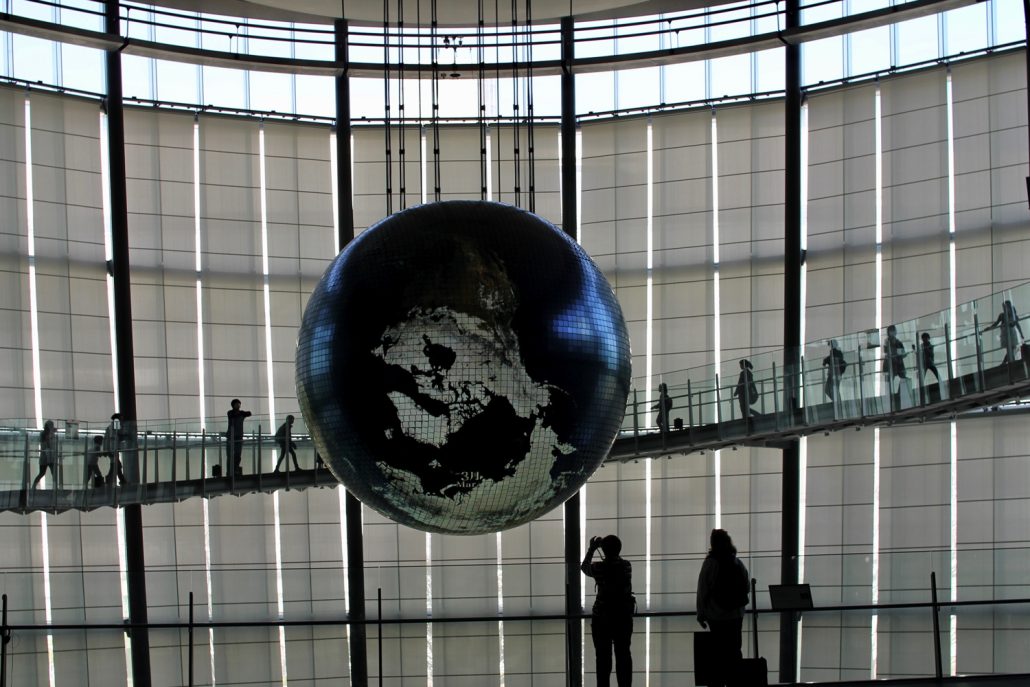
Travelers are encouraged to use the UC Travel Center to make travel arrangements for your Business Trip. The UC Travel Center offers discounts and negotiated contract rates with several air carriers to those flying on University business. Travelers are also eligible for state rates, which apply to government travelers.
UCLA Travel Center https://www.travel.ucla.edu/ UCLA Travel Counselors: (310) 206-2639 or (800) 235-UCLA (8252) UCLA Travel Counselors: Email: [email protected]
UCLA Travel Guidelines https://travel.ucla.edu/news-events/ucla-travel-guidelines/ UCLA Travel Resources Page https://www.travel.ucla.edu/additional-resources/
Departmental Response Times:
Your dedicated fully-remote staff will respond within 48 hours from the time they receive your request.
UCLA Travel Accounting Response Times (Travel Reimbursements):
It generally takes UCLA Travel Accounting 8-12 w eeks to process payments on all orders and reimbursements. Please plan events and notify your vendors well in advance to avoid penalties or disallowances.
TRAVEL POLICIES
- Direct Billed Airfare
- Personal Funds
- Payment on Behalf of Others
- Internet Package Deals
- Domestic Meals & Incidental Expenses
- Transportation
- Other Travel Expenses
- Foreign Per Diem
- Travel for 30 consecutive days or longer : Please contact your assigned fund manager to discuss your travel plans prior to planning your trip.
University travelers can request reimbursements for travel expenses after the business trip is completed. All travel reimbursement requests must be submitted to Financial Services within 21 days of the completed trip.
For travel reimbursements submitted after 60 days of the travel or event, the total amount of travel expenses may be imputed as income to the employee on the employee’s W2 unless there is a reasonable justification for the late submission. In all cases, if the submission is made more than 6 months after the end of the trip or event, income will be imputed on the employee’s W-2.
- How to Claim Reimbursement (January 2022)
- Required Documentation for Travel Reimbursements (May 2023)
Concur/New Express (May 2021):
- UCLA Concur QRG – Adding Delegates
- UCLA Concur QRG – Acting as a Delegate
- UCLA Concur QRG – Creating a New Expense Report
- UCLA Concur QRG – Creating a Report for a Guest
- UCLA Concur QRG – Creating a Report from a Request
- UCLA Concur QRG – Creating and Submitting a Request
- UCLA Concur QRG – Updating Your Expense Profile
- UCLA Guest Profile Creation
As outlined by UC Policy G-28, the following list includes a brief summary of non-reimbursable expenses:
- Airfare issued by non-U.S. carrier
- First class airfare
- Personal telephone calls
- Tipping over 20%
- Rentals: GPS navigator charges
- Rentals: Vehicle upgrades
- Rentals: Renting large cars need strong justification (only rent compact or intermediate sized vehicles)
- Third party expenses (e.g., buying ticket and paying hotel/airfare and other expense on behalf of others)
- Out-of-route costs (e.g., a connecting flight/deviation from direct route for a personal business) – reimbursable expenses shall not exceed the cost of hotels, meals, and other expenses that would have been incurred on a direct route to the UCLA business destination.
- Internet package deals- see section in Business Travel section above
- T&E Card Late Fees are not reimbursable
- Others – any other costs determined to be unreasonable or which are disallowed by University guidelines.
- Meals when travel is less than 24 hours and does not involve hotel stay.
Travel Insurance & Emergencies : UCLA Office of Insurance and Risk Management
- Safe Travels – Includes Emergency Number & Policy Numbers
- Student Travel Safety Passport – Includes Emergency Number & Policy Numbers
All University travelers, including employees, faculty and students, are covered worldwide, 24 hours a day, for a variety of accidents and incidents while on business travel status. The coverage includes accidental death and dismemberment. The coverage also includes travel assistance services when the traveler is 100+ miles from his or her home or headquarters, such as emergency medical evacuation, out-of-country medical expenses, loss of personal effects, security extraction and repatriation of remains.
The carrier, ACE USA, is highly rated and provides insurance products and services throughout the U.S. and around the world. In addition, ACE works with iJet Intelligent Risk Systems to provide travelers with practical destination intelligence and real-time travel alerts.
Booking travel through Connexxus automatically enrolls the traveler in the insurance program for travel outside of California; otherwise the traveler must register their trip on the UC Trips website and complete the Traveler Insurance form before an out-of-state trip occurs. Registration is not required for travel within California as coverage is automatic.
Business meals and entertainment expenditures in all instances must clearly identify the benefit to the University even when unrestricted funds are being used. University policy requires that documentation for entertainment should include a business purpose, cost, attendee list, and itemized receipts for reimbursement. In addition, the expenditure of funds for entertainment should be cost effective and in accordance with the best use of public funds.
- How to Place Entertainment Food Orders
- How-to-Claim-an-Entertainment-Reimbursement
- Entertainment Payment Process
- Approval of Advance Payment for Events
- Luskin Travel, Entertainment, & Reimbursement Form (v. 03.06.23)
- Travel Advance Request Template May 2023
- UCLA Travel Advance Form May 2023
- Travel Voucher May 2023
- Missing Receipt Affidavit May 2023
Travel Policy & Resources
G-28, Policy and Regulations Governing Travel BUS-79, Expenditures for Entertainment, Business Meetings & Other Occasions BUS-81, Insurance Programs Travel Security & Health Coverage Benefits
Share this:

UCLA Luskin School of Public Affairs
3250 Public Affairs Building - Box 951656 Los Angeles, CA 90095-1656
Campus Resources
- Maps, Directions, Parking
- Academic Calendar
- University of California
- Terms of Use
- Board of Advisors
- Diversity, Disparities and Difference
- UCLA Luskin in the News
- Luskin Forum Online
- Open Positions
- Public Policy
- Social Welfare
- Undergraduate Program
- Urban Planning
- Master of Public Policy
- Master of Social Welfare
- Double Degree With Sciences Po
- PhD in Social Welfare
- PhD in Urban Planning
- Undergraduate Programs
- Fellowships
- Student Support
- Graduate Resource Library
- Alumni Relations
- Commencement
- Research Centers & Affiliated Research
- CalSWEC Public Child Welfare Program
- Global Public Affairs (GPA)
- Data Analytics Certificate
- Luskin Lecture Series
- Luskin Summit
- Luskin Sacramento Briefing
- Public Policy at 25
- Public Service Weekend
- Academic Personnel
- Financial Services
- Emergency Safety
- Events Calendar
- Reserve a Room
- Human Resources
- For New Staff and Faculty
- Information Technology

Travel, Entertainment & T&E Cards
Business travel & entertainment.
Reimbursements for Business Travel and entertainment expenses are also handled in the Business Office.
Travel Reimbursements should be submtited to [email protected]
For Travel Reimbursement Form and Entertainment Reimbursement , please submit with the following:
- Please fill out all sections of the form applicable to your trip/business function
- Verify that FAU (account number) is accurate
- Signature (digital or handwritten) must be included on the form
- Receipts must be attached
General Travel Information
- Only pay for your own travel related costs – DO NOT pay on behalf of others. This is against University policy and you will risk not being reimbursed. If you have any concerns in this area please speak to your fund manager as soon as possible.
- Travelers are required to use the most economical mode of transportation.
- UCLA has negotiated preferred rates with various airlines and international carriers. Rates are extended only to UCLA business travelers and must be booked through the UCLA Travel center via phone, reservation request form, or email: UCLA Travel Center (310) 206-2639, [email protected] .
- If you would like to use your contract or grant funding to pay for your travel, please specify that with the travel agent at time of booking. The travel agent will forward the itinerary to your assigned fund manager and a PTA (Pre-Trip Authorization) will be created for the airfare.
- Claims must be submitted to the Business Office as soon as possible but no more than 30 days after the end of a trip. If claims are submitted after 30 days then a business justification memo must be submitted explaining the late submission.
- Reimbursements submitted after 6 months also need a business justification memo and will be reported to payroll and imputed as employee income.
- Privately-owned vehicles are allowed to be used for official university business. Travelers may claim mileage for travel actually incurred, either in route to and from the travel destination or to and from a common carrier terminal (this does not include mileage between home and the University).
- The standard reimbursement rate per mile is $0.655 in conformance with the IRS.
- Domestic meals and incidental expenses are reimbursed on an actual basis, subject to a limit for each full day on travel status. Meal reimbursements are unallowed for less than a 24 hour overnight stay travel period. The daily maximum meal reimbursement limit is $79 per day.
- The meal and incidental expense cap is not to be treated as a per diem. No exceptions shall be made to the M&IE cap.
- Domestic lodging expenses are reimbursed on the amount actually incurred. Lodging reimbursements are actual up to $275 per night before taxes and mandatory hotel fees. Please include an original itemized hotel receipt , not just the credit card receipt. The itemized receipt must reflect a $0 balance.
- If the prearranged conference lodging rate exceeds the $275 per night cap, the traveler may stay at the conference hotel.
- Domestic lodging is not reimbursable if the lodging site is within a 50-mile radius of the traveler’s residence or office.
- Foreign travel shall be reimbursed in accordance with the Federal Maximum Travel Per Diem Allowances for Foreign Areas published by the Department of State. Per Diem rates can be obtained by visiting the Travel Services website listed in the “related links” section below.
- Registration fees for conferences, conventions, meetings of professional or learned societies, or community organizations are processed through the UCLA Travel Center. Such fees are only reimbursable post-conference/convention/meetings and can be pre-paid.
- Alcoholic beverages or tobacco purchases may not be charged to State Funds, or Federal Funds (Contracts or Grants).
- The maximum rates for entertainment expenses per person are: Breakfast $31, Lunch $54, Dinner $94, Light Refreshments $22 .
- Required documentation for entertainment expenses include : list of attendees, University affiliation and purpose or the nature of the event.
Food orders , please fill out Food order form and submit to [email protected] with the following:
- All sections of the form filled out entirely
- Include the authorizing PI/Administrator as a carbon copy
- A guest list with full name and UCLA affiliation of each attendee
- Insurance Programs
Travel Insurance
Trip registration is required for those traveling on official University business off-campus (>100 miles) or internationally. Accurate information on travel plans is needed in order to deliver the services and protections the travel insurance policy offers. University travelers include employees, medical residents, students, fellows, and guests with travel paid by the University.
If you are a travel arranger or international program manager, contact our office to join our travel alert listserv.
The following information will help you to plan your trip and connect you to resources to help ensure your safety while traveling.
Register a Trip
Travel registration does not guarantee that your trip is eligible for travel insurance coverage.
* UC employees must be on approved university business during which they will be compensated by the university. * UC students must be participating in a UC sponsored and supervised off-campus activity that meets the policy definition of a ‘covered activity.’
Travel to these countries, and interactions with organizations or individuals in them, are highly regulated. Prior to traveling, special permission from the U.S. government in the form of a license may be required for any of the following activities: * Financial transactions * Providing a service (of any kind) * Conference attendance or presentations * Conducting research * Education or outreach * Hand carrying laptops, equipment, material or information as part of your travel You must coordinate with UCLA Export Control before travel to these sanctioned counties to ensure that the appropriate compliance steps are taken.
Special notice on medical services: payments for medical services in this country cannot be processed by UC’s travel assistance provider. Travelers must make any medical care payments out of pocket and submit a claim for reimbursement within three months after the service date.
To request a certificate of insurance to acquire a visa, demonstrate coverage for COVID-19, or any other reason, please send the following information to [email protected] :
First and last name Affiliation with UC (student, employee, etc.) Date of birth Dates of travel Travel destination (country or countries to be visited) Additional Information as requested by the travel destination’s embassy
Please allow 3-5 business days for your insurance certificate request to be processed. You will receive it as a PDF document attached to an email.
Planning a Trip
Global travel tips concerning security, health, culture, transportation, legal, financial and language are readily available by using your UCLA Single Sign-On password at: http://ermsp.ucop.edu/uctrip .
As always, be sure to register your travel . This will ensure that the University and our travel partners can provide you with information and services important to your security, health and safety, both before and during your travels.
The Worldcue App provides travel intelligence and assistance while on-the-go.
To obtain the app:
- Search for “Worldcue Mobile” from the App store or Android Google Play and download the app. - Sign In to the Worldcue App using your activated Traveler username and password. - The Worldcue app
Important Worldcue Mobile App utilities: - Hotline Button: Use this button to connect with University of California's 24X7 Hotline Center in the event of an incident.
You are required to submit a field safety plan before going into the field!
Mobile Devices and Data Roaming Charges
If you are traveling internationally and plan to use your mobile device for email, please contact the UCLA Mobile Program at [email protected] to add international features before you leave the country. Data roaming charges without a plan are very high and are applied if international data roaming is turned on, whether or not you actually use your email or web browser. Data Restrictions
If you are traveling with electronic devices, it is important to take steps to protect and secure information stored on those devices. Consider some of the following steps to protect your information: * Leave your data or laptop at home or use a loaner laptop wiped clean before your trip * Backup your data * Use a Virtual Private Network (VPN) * Password protect (secure) or encrypt (more secure) your hard drive * Maintain physical control of your devices at all times, or secure them in a locked desk or hotel safe to prevent theft or unauthorized access * Only connect trusted items to your devices (e.g. thumb drives or wireless devices) * Contact your local IT administrator for assistance if needed. Hand carrying computers, research materials, samples or equipment When you travel abroad, everything you take with you is an export including hand carried equipment, research materials, and unpublished or proprietary information or data. UCLA Export Controls can determine whether an export license is required to travel with these items.
If you are traveling to an area with additional health risks , you are encouraged to visit a travel clinic in advance of your travel. It is recommended that you schedule a visit as soon as possible in case multiple rounds of vaccines are required.
Employees can make an appointment with UCLA’s Occupational Health showing proof of UCLA travel registration or may visit another travel clinic provided by your health insurance program. Please ensure your appointment is at least 2 or more weeks in advance of your departure.
If you are a Student qualified for Ashe Center visits, you may visit their travel clinic for health advice and vaccinations while traveling.
Travel Insurance and Filing a Claim
* Coverage for domestic (US) travel is limited to medical evacuation and eligible medical expenses when you have an accident during or while traveling to/from a covered activity* (conditions apply). US health insurance is the primary source of insurance for such accidents.
NOTE - There is coverage for certain students who are injured while participating in certain on-campus activities. Contact your campus Risk Management office for more information.
*Coverage for international travel is more extensive and may include medically necessary care for accidents and illnesses, mental health counseling, medical and security evacuation, trip delay/cancellation/interruption (conditions apply), and personal property coverage*. * Travel insurance only covers trips 365-days in length. If an assignment abroad will last a year or more, contact your US health insurance administrator to see if the policy has a global component. For example, Anthem Blue Cross PPO has the Global Core Program. All treatment received internationally will be considered ‘out of network’ and pre-approvals are required for most non-emergency treatments. *Travel insurance coverage, including security evacuations, may be limited in countries with comprehensive OFAC sanctions due to restrictions on doing business in those countries. Even if you get a license to travel there, you will likely have to cover any medical or security costs out of pocket. definition of a ‘covered activity.’
Getting Help While Traveling
If you need assistance while traveling use the policy number on your travel insurance card and contact:
AXA Assistance 1-630-694-9804 (From anywhere in the world) 1-855-327-1420 (From within the US) [email protected] Include your full name, UC campus, UC affiliation (ex. UC student or UC employee), current location, details of the assistance needed, and how they should get in touch with you.
Worldcue App
To obtain the app: - Search for “Worldcue Mobile” from the App store or Android Google Play and download the app. - Sign In to the Worldcue App using your activated Traveler username and password. - The Worldcue app Important Worldcue Mobile App utilities: - Hotline Button: Use this button to connect with University of California's 24X7 Hotline Center in the event of an incident.
- Trip Registration through Away
- Guidelines for UCLA Students Traveling Abroad
- UC Field Operations Manual
- Connexxus Portal
- Travel Center Staff Directory
- Helpful Travel Planning Links
- UC Personal Travel Program
10920 Wilshire Boulevard, Suite 620 Los Angeles, CA 90024
Phone: (310) 794-6948 Fax: (310) 794-6957
© 2024 Regents of the University of California
- Accessibility
- Report Misconduct
- Privacy & Terms of Use

Cotsen Travel and Entertainment Reimbursement Information
In order to submit a request for reimbursement, download and fill out the form from the link below. Once completed, email the form to [email protected] .
Be sure to review the UC Policies below before scheduling any travel or submitting a request for reimbursement. If you have any questions, please email: [email protected] .
- Travel and Entertainment Reimbursement Request Form
UC Travel & Entertainment Reimbursement Guidelines
For the latest information, please review the following University of California policies:
- Policy BFB-G-28 describes rules and procedures governing business-related travel.
- Policy BUS-79 addresses reimbursements for business meals and entertainment.
As outlined by UC Policy G-28, the following expenses are not allowable:
- Third party expenses (e.g., buying ticket and paying hotel/airfare and other expense on behalf of others).
- Meals when travel is less than 24 hours and does not involve hotel stay.
- Travel packages purchased from any outside vendor without prior approval from Travel Accounting.
I. SUBMISSION DEADLINE
a. All travel reimbursement requests should be submitted within 30 days of the conclusion of travel or event. For late submissions, the amount of the travel or event expenses may be imputed as income to the employee on the employee’s W- 2. In all cases, if the submission is made more than 6 months after the end of the trip or event, income will be imputed on the employee’s W-2.
II. APPROVALS
a. Exceptions should be approved prior to incurring the exception.
b. Faculty members who would like exceptions to policy for these guidelines should seek approval from Travel Accounting. These approvals should be attached to the reimbursement request.
III. AIRFARE
a. The UC Travel Center's Direct Billing System should be used for airline tickets purchased for Business Travel. Use of the Direct Billing System eliminates the need for the Traveler to pay out of pocket and then be reimbursed.
b. UCLA will only pay for or reimburse economy fares (See Policy BFB-G-28, pg. 17 for allowable exceptions).
c. Employees who wish to purchase an upgradable business class ticket (i.e., a ticket that provides the option to upgrade from business class to first class) must pay any increase in price from a non-upgradeable business class ticket. Documentation of ticket prices from the date of purchase must be attached to the travel reimbursement form.
d. Only U.S. air carriers shall be used for all travel reimbursed from federal grants and contracts, including NIH grants (See Policy BFB-G-28, pg. 17& 18 for allowable exceptions).
e. If vacation days comprise over 50% of international trips longer than one week in duration, UCLA will prorate airfare and other general expenses between vacation and work days. In order for UCLA to pay for even a prorated portion of the airfare, the primary purpose of the trip must be UCLA business, not personal.
f. Travelers should seek advance approval for trips longer than 30 days.
g. It is important to note that travel packages from internet vendors (i.e., Expedia, Travelocity, Orbitz) typically do not itemize expenses. Therefore, no business-related travel should be booked as a package through such vendors unless the traveler confirms in advance that airfare, hotel, and rental car will be itemized separately. Individually purchased airfare, hotel and rental car through such vendors is acceptable.
h. The UC Travel Center can assist with all airfare tickets and advise travelers on how to comply with University policy and campus guidelines. Travel Center staff is trained in providing appropriate documentation for ticket costs, including trips that involve exceptions to policy. Contact UC Travel Center
a. Daily domestic and international hotel rates should not exceed the federal per diem guidelines.
b. For domestic travel for less than 30 days lodging, meals and incidental expenses (M&IE) will be reimbursed based on actual amounts incurred and shall not be treated as per diem. Lodging and M&IE reimbursement shall be limited to the actual reasonable costs incurred; M&IE subject to daily maximum reimbursement cap of $62.
c. Travelers should obtain advance approval (i.e., prior to the hotel stay) of hotel fees in excess of these guidelines.
V. ENTERTAINMENT
a. Always submit itemized receipts regardless of amount.
b. Events with light refreshments should be distinct from events with meals. In other words, meals that include appetizers will be reimbursed at the limit for meals, not meals plus light refreshments.
c. Tips should not exceed 20% of the meal costs. Any excess tip amount is responsibility of the event host.
VI. GROUND TRANSPORTATION
a. Travelers are advised to use economical methods of ground transportation, such as taxis, shuttles or other or similar. When a driver is needed, an adequate business justification specific to the event is required.
b. Tips should not exceed 20% of the transportation costs. The traveler may be asked to pay the difference between a 20% and larger tip.
c. Car Rental:
- UC Travel Policy requires that an economy, compact or intermediate model be requested. These models should be used unless a no-cost upgrade is provided. Justification is required for cars larger than a mid-size when submitting for reimbursement.
- The University has preferred agreements with five rental car agencies for travelers on University business. The agreements include the highest level of Loss Damage Waiver (LDW) and Liability insurance. Travelers or arrangers must book using the UCLA ID number to get the negotiated rate and decline all optional insurance, as this is already included in the negotiated price. If the traveler purchases additional insurance when booking through UCLA, this cost will not be reimbursed. Cars may be booked through the UC Travel Center, online or via telephone direct to the rental agency. See car rental contract rates for more information.
VII. BUSINESS JUSTIFICATIONS
a. Each travel and entertainment expense reimbursement request must be accompanied by a written business justification. The justification should meet the particular circumstances of the travel or expense. Inadequate business justification increases the risk that the expense will appear inappropriate and therefore rejected.
b. The business purpose of a University traveler may include activities that contribute to any one of the University’s major functions of teaching, research, patient care, or public service, or to any other substantial and bona fide University business expense.
c. The individual incurring the expense is required to affirm the appropriateness of the business justification by manually or electronically signing the reimbursement request.
Coronavirus guidance for travel
To the Campus Community:
We are writing to share updated travel guidance, given that the prevalence of the novel coronavirus (COVID-19) in the United States and internationally is changing rapidly.
For international travel:
- UCLA prohibits official university travel to all regions with Level 3 Travel Warnings for coronavirus from the CDC: mainland China, South Korea, Italy and Iran.
- We strongly discourage personal travel to jurisdictions with Level 3 Travel Warnings.
- Any traveler arriving from these areas must self-isolate for 14 days from the time they left that country, in accordance with new guidance from the CDC. (This provision is retroactive to the last 14 days.)
- These requirements will also be imposed for any region the CDC raises to Level 3 for the coronavirus in the coming weeks.
- UCLA discourages all other nonessential international travel for now. If you decide to travel, be aware that other countries could change travel restrictions without notice, flights may be canceled or new re-entry restrictions could be imposed when returning to the United States.
- Consider obtaining travel insurance through the UC Office of the President Travel Insurance website or the provider of your choice.
- Stay informed about developments in your destination by monitoring the travel guidance provided by the CDC .
- Make sure your family and friends are aware of your plans and how to reach you.
For domestic travelers:
- Use caution and judgment before any domestic travel, and check for the latest information before your trip.
For large conferences and events:
- We are following the guidance of health officials and there is currently no recommendation to avoid attending large conferences on campus. However, we still urge you to use caution and judgment if you decide to attend large conferences.
For incoming visitors to campus:
- Any visitor arriving to campus from a Level 3 jurisdiction (currently mainland China, South Korea, Italy and Iran), must also follow the CDC guidelines to self-isolate for 14 days since the date they left that country.
- This also applies to visitors who have been invited to campus by UCLA groups and programs.
UCLA is taking measures to prevent the spread of COVID-19. Examples include:
- Installing hand sanitizer stations across campus, and in university-provided housing and dining area entries and on BruinBuses
- Cleaning restrooms and public areas with anti-viral, anti-bacterial chemical solutions
- Increasing frequency of cleaning in residential and dining area high-touch surfaces
- Employing electrostatic sprayer systems in high-use areas to disinfect around curved and hard-to-reach surfaces
We want to reiterate that you can prevent the spread of COVID-19 by taking other precautions like washing your hands frequently and for at least 20 seconds, containing coughs into a tissue or sleeve, and staying home if you are sick, especially if you have a respiratory illness and fever. If you develop flu-like symptoms — fever, cough and difficulty breathing — and are concerned that you may have been exposed to COVID-19, seek medical attention. Students should call the Ashe Center Infection Control Line at 310-206-6217 and faculty and staff should call their health care providers. Please always call ahead before arriving.
We encourage you to visit the COVID-19 information page on UCLA Newsroom , which is frequently updated with the latest guidance and resources. As always, emergency preparedness information and resources can be found at Bruins Safe Online . We will continue to work closely with public health officials and provide updates and community information sessions.
Please also remember that UCLA is an inclusive and welcoming community, and we must not stigmatize anyone based on appearance or national origin. We recognize that there are concerns among the campus community and we remain grateful for the calm and thoughtful manner in which Bruins are caring for themselves and each other.
Michael J. Beck Administrative Vice Chancellor
Monroe Gorden, Jr. Vice Chancellor, Student Affairs
Recommended COVID-19 resources
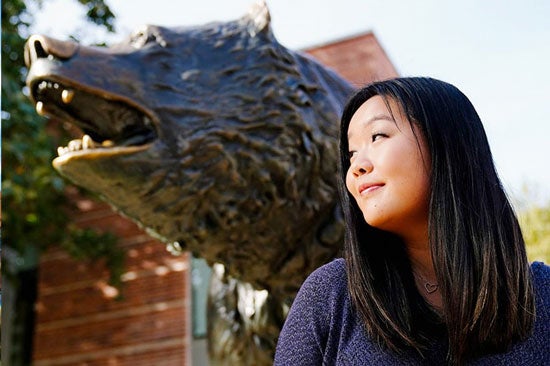
Campus support
COVID-19 information

For journalists
UCLA faculty members are available for interviews with news media on a wide range of topics related to COVID-19, including public health and epidemiology, virology and vaccines, mental health, education, law, politics and the economy.
Have a comment about the information on this site? Send us a message
Southwest to exit 4 airports and limit hiring following profit loss, Boeing plane delays

Southwest Airlines said it will limit hiring and suspend operations at four airports in the U.S. and Mexico following a loss of profits and delays getting planes from Boeing .
In a release posted after the company's earnings call Thursday, the Dallas, Texas-based budget airline reported a net loss of $231 million in the first quarter of 2024. Southwest President and CEO Bob Jordan called those losses "disappointing," and said the airline is adjusting to "slower than planned growth for this year and next."
In an interview with CNBC ahead of the earnings call Thursday, Jordan said the company was weighing options for cabin reconfiguration to address its recent revenue shortfall.
“We’re looking into new initiatives, things like the way we seat and board our aircraft,” Jordan told the network.
The airline said it now expects to end this year with approximately 2,000 fewer employees than 2023 through cost control initiatives, including limiting hiring and offering voluntary time off programs, not through furloughs or layoffs.
And with aircraft delivery delays from Boeing that could continue into 2025, Southwest said it is also planning to mitigate any operational and financial impacts while keeping reliable flight schedules for customers.
'Roughest landing': Watch video of plane bouncing off runway as it attempts to land at LAX
What airports is Southwest leaving?
After reporting financial losses in the first quarter of 2024, Southwest said it is closing operations at four airports, three in the U.S. and one in Mexico, the first time the airline has exited an airport since 2019.
- Bellingham International Airport in Bellingham, Washington
- George Bush Intercontinental Airport in Houston, Texas
- Syracuse Hancock International Airport in Syracuse, New York
- Cozumel International Airport in Mexico
Southwest also announced plans to cut about half its flights out of the Hartsfield-Jackson Atlanta International Airport and one third from the Chicago O'Hare International Airport.
Although Southwest is pulling out of George Bush Intercontinental Airport, the company will maintain operations out of the William P. Hobby Airport in Houston.
Contributing: Zach Wichter, USA TODAY.
Planning a trip to Moscow? Our travel guide contains up-to-date, personal information on everything from what to see , to when to visit , where to stay , and what to eat !
- General Information
- What to see
- How to get to Moscow
- Where to stay
- Where to eat
Why visit Moscow?
Majestic churches, impressive historic fortresses, and palatial buildings: Moscow is a fascinating city whose emblematic architecture reflects the turbulent history that has defined Russia throughout the centuries.
The traces of the USSR can be found around every corner of the city , side by side with the iconic relics of Imperial Russia , like the mythical Red Square , the imposing Kremlin , and the beautiful St Basil's Cathedral .
Discover a fascinating world of Cold War bunkers, golden-domed basilicas, world-class art museums, and the legendary "palace of the people," as the Moscow Metro has been nicknamed. Whether you fancy watching a classical Russian ballet at the Bolshoi Theatre , perusing the fine arts at the Pushkin Museum , or marveling at the sheer size of the monuments to the Soviet state's achievements at the All-Russia Exhibition Centre , this travel guide will help you on your way!
Where to start?
If you're going to travel to Moscow and you don't know much about the city yet, the first thing to do is to dive into its legendary history - understanding the past will help you understand the present. Next, check out our practical hints and tips on traveling to the city before discovering which of its most important museums , monuments , and attractions pique your interest.
Looking for a place to stay?
Booking your accommodation in advance is the best way to get great discounts. Our detailed guide on where to stay in Moscow will help you decide which neighborhood you'd like to look for hotels or apartments in, and our hotel search engine will find you the best deals!
Why is our Moscow travel guide the best?
Introducing Moscow is a city guide written by travelers for travelers and contains personalized advice to help you make the most of your trip to the city.
All the information in this guide is valid as of December 2022. If you find any errors or have any comments, please feel free to contact us .

Our travel guides
- top attractions
- where to stay
- and much more
latest in US News

College protesters seek amnesty to keep arrests and suspensions...

New York trans advocate, park ranger falls to her death while ice...

Doctor who drove Tesla off cliff with family inside had...

Biden tries to downplay age with jokes, mocks Trump at White...

Hero grandma shoots burglar who interrupted Taylor Swift movie...

Pennsylvania state bills middle-class man $34B in baffling income...

Environmentalist smashes world record by hugging 1,123 trees in...

Beloved New York Post photographer dead at 78
College protesters seek amnesty to keep arrests and suspensions from trailing them.
Thanks for contacting us. We've received your submission.
Maryam Alwan figured the worst was over after New York City police in riot gear arrested her and other protesters on the Columbia University campus, loaded them onto buses and held them in custody for hours.
But the next evening, the college junior received an email from the university.
Alwan and other students were being suspended after their arrests at the “Gaza Solidarity Encampment,” a tactic colleges across the country have deployed to calm growing campus protests against the Israel-Hamas war.

The students’ plight has become a central part of protests, with students and a growing number of faculty demanding their amnesty. At issue is whether universities and law enforcement will clear the charges and withhold other consequences, or whether the suspensions and legal records will follow students into their adult lives.
Terms of the suspensions vary from campus to campus.
At Columbia and its affiliated Barnard College for women, Alwan and dozens more were arrested April 18 and promptly barred from campus and classes, unable to attend in-person or virtually, and banned from dining halls.
Questions about their academic futures remain. Will they be allowed to take final exams? What about financial aid? Graduation? Columbia says outcomes will be decided at disciplinary hearings, but Alwan says she has not been given a date.
“This feels very dystopian,” said Alwan, a comparative literature and society major.
What started at Columbia has turned into a nationwide showdown between students and administrators over anti-war protests and the limits of free speech.

In the past 10 days, hundreds of students have been arrested, suspended, put on probation and, in rare cases, expelled from colleges including Yale University, the University of Southern California, Vanderbilt University and the University of Minnesota.
Barnard, a women’s liberal arts college at Columbia, suspended more than 50 students who were arrested April 18 and evicted them from campus housing, according to interviews with students and reporting from the Columbia Spectator campus newspaper, which obtained internal campus documents.
On Friday, Barnard announced it had reached agreements restoring campus access to “nearly all” of them. A statement from the college did not specify the number but said all students who had their suspensions lifted have agreed to follow college rules and, in some cases, were put on probation.
On the night of the arrests, however, Barnard student Maryam Iqbal posted a screenshot on the social media platform X of a dean’s email telling her she could briefly return to her room with campus security before getting kicked out.

“You will have 15 minutes to gather what you might need,” the email read.
More than 100 Barnard and Columbia faculty staged a “Rally to Support Our Students” last week condemning the student arrests and demanding suspensions be lifted.
Columbia is still pushing to remove the tent encampment on the campus main lawn where graduation is set to be hosted May 15.
The students have demanded the school cuts ties with Israel-linked companies and ensure amnesty for students and faculty arrested or disciplined in connection with the protests.
“Talks with the student protesters are continuing, said Ben Chang, a Columbia spokesperson. “We have our demands; they have theirs,” he said.
Israel War Update
Get the most important developments in the region, globally and locally.
Thanks for signing up!
Please provide a valid email address.
By clicking above you agree to the Terms of Use and Privacy Policy .
Never miss a story.
For international students facing suspension, there is the added fear of losing their visas, said Radhika Sainath, an attorney with Palestine Legal, which helped a group of Columbia students file a federal civil rights complaint against the school Thursday.
It accuses Columbia of not doing enough to address discrimination against Palestinian students.
“The level of punishment is not even just draconian, it feels like over-the-top callousness,” Sainath said.

More than 40 students were arrested at a Yale demonstration last week, including senior Craig Birckhead-Morton. He is due to graduate May 20 but says the university has not yet told him if his case will be submitted to a disciplinary panel.
He worries about whether he will receive a diploma and if his acceptance to Columbia graduate school could be at risk.
“The school has done its best to ignore us and not tell us what happens next,” said Birckhead-Morton, a history major.
Across the country, college administrators have struggled to balance free speech and inclusivity. Some demonstrations have included hate speech, antisemitic threats or support for Hamas, the group that attacked Israel on Oct. 7, sparking a war in Gaza that has left more than 34,000 dead.
May commencement ceremonies add pressure to clear demonstrations.
University officials say arrests and suspensions are a last resort, and that they give ample warnings beforehand to clear protest areas.
Vanderbilt University in Tennessee has issued what are believed to be the only student expulsions related to protesting the Israel-Hamas conflict, according to the Institute for Middle Eastern Understanding.
More than two dozen students occupied the university chancellor’s office for several hours on March 26, prompting the university to summon police and arrest several protesters. Vanderbilt then issued three expulsions, one suspension and put 22 protesters on probation.
In an open letter to Chancellor Daniel Diermeier, more than 150 Vanderbilt professors criticized the university’s crackdown as “excessive and punitive.”
Freshman Jack Petocz, 19, one of those expelled, is being allowed to attend classes while he appeals. He has been evicted from his dorm and is living off campus.

Petocz said protesting in high school was what helped get him into Vanderbilt and secure a merit scholarship for activists and organizers. His college essay was about organizing walkouts in rural Florida to oppose Gov. Ron DeSantis’ anti-LGBTQ policies.
“Vanderbilt seemed to love that,” Petocz said. “Unfortunately, the buck stops when you start advocating for Palestinian liberation.”
Share this article:

Advertisement
2018 Primetime Emmy & James Beard Award Winner
In Transit: Notes from the Underground
Jun 06 2018.
Spend some time in one of Moscow’s finest museums.
Subterranean commuting might not be anyone’s idea of a good time, but even in a city packing the war-games treasures and priceless bejeweled eggs of the Kremlin Armoury and the colossal Soviet pavilions of the VDNKh , the Metro holds up as one of Moscow’s finest museums. Just avoid rush hour.
The Metro is stunning and provides an unrivaled insight into the city’s psyche, past and present, but it also happens to be the best way to get around. Moscow has Uber, and the Russian version called Yandex Taxi , but also some nasty traffic. Metro trains come around every 90 seconds or so, at a more than 99 percent on-time rate. It’s also reasonably priced, with a single ride at 55 cents (and cheaper in bulk). From history to tickets to rules — official and not — here’s what you need to know to get started.
A Brief Introduction Buying Tickets Know Before You Go (Down) Rules An Easy Tour
A Brief Introduction
Moscow’s Metro was a long time coming. Plans for rapid transit to relieve the city’s beleaguered tram system date back to the Imperial era, but a couple of wars and a revolution held up its development. Stalin revived it as part of his grand plan to modernize the Soviet Union in the 1920s and 30s. The first lines and tunnels were constructed with help from engineers from the London Underground, although Stalin’s secret police decided that they had learned too much about Moscow’s layout and had them arrested on espionage charges and deported.
The beauty of its stations (if not its trains) is well-documented, and certainly no accident. In its illustrious first phases and particularly after the Second World War, the greatest architects of Soviet era were recruited to create gleaming temples celebrating the Revolution, the USSR, and the war triumph. No two stations are exactly alike, and each of the classic showpieces has a theme. There are world-famous shrines to Futurist architecture, a celebration of electricity, tributes to individuals and regions of the former Soviet Union. Each marble slab, mosaic tile, or light fixture was placed with intent, all in service to a station’s aesthetic; each element, f rom the smallest brass ear of corn to a large blood-spattered sword on a World War II mural, is an essential part of the whole.
The Metro is a monument to the Soviet propaganda project it was intended to be when it opened in 1935 with the slogan “Building a Palace for the People”. It brought the grand interiors of Imperial Russia to ordinary Muscovites, celebrated the Soviet Union’s past achievements while promising its citizens a bright Soviet future, and of course, it was a show-piece for the world to witness the might and sophistication of life in the Soviet Union.
It may be a museum, but it’s no relic. U p to nine million people use it daily, more than the London Underground and New York Subway combined. (Along with, at one time, about 20 stray dogs that learned to commute on the Metro.)
In its 80+ year history, the Metro has expanded in phases and fits and starts, in step with the fortunes of Moscow and Russia. Now, partly in preparation for the World Cup 2018, it’s also modernizing. New trains allow passengers to walk the entire length of the train without having to change carriages. The system is becoming more visitor-friendly. (There are helpful stickers on the floor marking out the best selfie spots .) But there’s a price to modernity: it’s phasing out one of its beloved institutions, the escalator attendants. Often they are middle-aged or elderly women—“ escalator grandmas ” in news accounts—who have held the post for decades, sitting in their tiny kiosks, scolding commuters for bad escalator etiquette or even bad posture, or telling jokes . They are slated to be replaced, when at all, by members of the escalator maintenance staff.
For all its achievements, the Metro lags behind Moscow’s above-ground growth, as Russia’s capital sprawls ever outwards, generating some of the world’s worst traffic jams . But since 2011, the Metro has been in the middle of an ambitious and long-overdue enlargement; 60 new stations are opening by 2020. If all goes to plan, the 2011-2020 period will have brought 125 miles of new tracks and over 100 new stations — a 40 percent increase — the fastest and largest expansion phase in any period in the Metro’s history.
Facts: 14 lines Opening hours: 5 a.m-1 a.m. Rush hour(s): 8-10 a.m, 4-8 p.m. Single ride: 55₽ (about 85 cents) Wi-Fi network-wide
Buying Tickets
- Ticket machines have a button to switch to English.
- You can buy specific numbers of rides: 1, 2, 5, 11, 20, or 60. Hold up fingers to show how many rides you want to buy.
- There is also a 90-minute ticket , which gets you 1 trip on the metro plus an unlimited number of transfers on other transport (bus, tram, etc) within 90 minutes.
- Or, you can buy day tickets with unlimited rides: one day (218₽/ US$4), three days (415₽/US$7) or seven days (830₽/US$15). Check the rates here to stay up-to-date.
- If you’re going to be using the Metro regularly over a few days, it’s worth getting a Troika card , a contactless, refillable card you can use on all public transport. Using the Metro is cheaper with one of these: a single ride is 36₽, not 55₽. Buy them and refill them in the Metro stations, and they’re valid for 5 years, so you can keep it for next time. Or, if you have a lot of cash left on it when you leave, you can get it refunded at the Metro Service Centers at Ulitsa 1905 Goda, 25 or at Staraya Basmannaya 20, Building 1.
- You can also buy silicone bracelets and keychains with built-in transport chips that you can use as a Troika card. (A Moscow Metro Fitbit!) So far, you can only get these at the Pushkinskaya metro station Live Helpdesk and souvenir shops in the Mayakovskaya and Trubnaya metro stations. The fare is the same as for the Troika card.
- You can also use Apple Pay and Samsung Pay.
Rules, spoken and unspoken
No smoking, no drinking, no filming, no littering. Photography is allowed, although it used to be banned.
Stand to the right on the escalator. Break this rule and you risk the wrath of the legendary escalator attendants. (No shenanigans on the escalators in general.)
Get out of the way. Find an empty corner to hide in when you get off a train and need to stare at your phone. Watch out getting out of the train in general; when your train doors open, people tend to appear from nowhere or from behind ornate marble columns, walking full-speed.
Always offer your seat to elderly ladies (what are you, a monster?).
An Easy Tour
This is no Metro Marathon ( 199 stations in 20 hours ). It’s an easy tour, taking in most—though not all—of the notable stations, the bulk of it going clockwise along the Circle line, with a couple of short detours. These stations are within minutes of one another, and the whole tour should take about 1-2 hours.
Start at Mayakovskaya Metro station , at the corner of Tverskaya and Garden Ring, Triumfalnaya Square, Moskva, Russia, 125047.
1. Mayakovskaya. Named for Russian Futurist Movement poet Vladimir Mayakovsky and an attempt to bring to life the future he imagined in his poems. (The Futurist Movement, natch, was all about a rejecting the past and celebrating all things speed, industry, modern machines, youth, modernity.) The result: an Art Deco masterpiece that won the National Grand Prix for architecture at the New York World’s Fair in 1939. It’s all smooth, rounded shine and light, and gentle arches supported by columns of dark pink marble and stainless aircraft steel. Each of its 34 ceiling niches has a mosaic. During World War II, the station was used as an air-raid shelter and, at one point, a bunker for Stalin. He gave a subdued but rousing speech here in Nov. 6, 1941 as the Nazis bombed the city above.
Take the 3/Green line one station to:
2. Belorusskaya. Opened in 1952, named after the connected Belarussky Rail Terminal, which runs trains between Moscow and Belarus. This is a light marble affair with a white, cake-like ceiling, lined with Belorussian patterns and 12 Florentine ceiling mosaics depicting life in Belarussia when it was built.

Transfer onto the 1/Brown line. Then, one stop (clockwise) t o:
3. Novoslobodskaya. This station was designed around the stained-glass panels, which were made in Latvia, because Alexey Dushkin, the Soviet starchitect who dreamed it up (and also designed Mayakovskaya station) couldn’t find the glass and craft locally. The stained glass is the same used for Riga’s Cathedral, and the panels feature plants, flowers, members of the Soviet intelligentsia (musician, artist, architect) and geometric shapes.
Go two stops east on the 1/Circle line to:
4. Komsomolskaya. Named after the Komsomol, or the Young Communist League, this might just be peak Stalin Metro style. Underneath the hub for three regional railways, it was intended to be a grand gateway to Moscow and is today its busiest station. It has chandeliers; a yellow ceiling with Baroque embellishments; and in the main hall, a colossal red star overlaid on golden, shimmering tiles. Designer Alexey Shchusev designed it as an homage to the speech Stalin gave at Red Square on Nov. 7, 1941, in which he invoked Russia’s illustrious military leaders as a pep talk to Soviet soldiers through the first catastrophic year of the war. The station’s eight large mosaics are of the leaders referenced in the speech, such as Alexander Nevsky, a 13th-century prince and military commander who bested German and Swedish invading armies.

One more stop clockwise to Kurskaya station, and change onto the 3/Blue line, and go one stop to:
5. Baumanskaya. Opened in 1944. Named for the Bolshevik Revolutionary Nikolai Bauman , whose monument and namesake district are aboveground here. Though he seemed like a nasty piece of work (he apparently once publicly mocked a woman he had impregnated, who later hung herself), he became a Revolutionary martyr when he was killed in 1905 in a skirmish with a monarchist, who hit him on the head with part of a steel pipe. The station is in Art Deco style with atmospherically dim lighting, and a series of bronze sculptures of soldiers and homefront heroes during the War. At one end, there is a large mosaic portrait of Lenin.
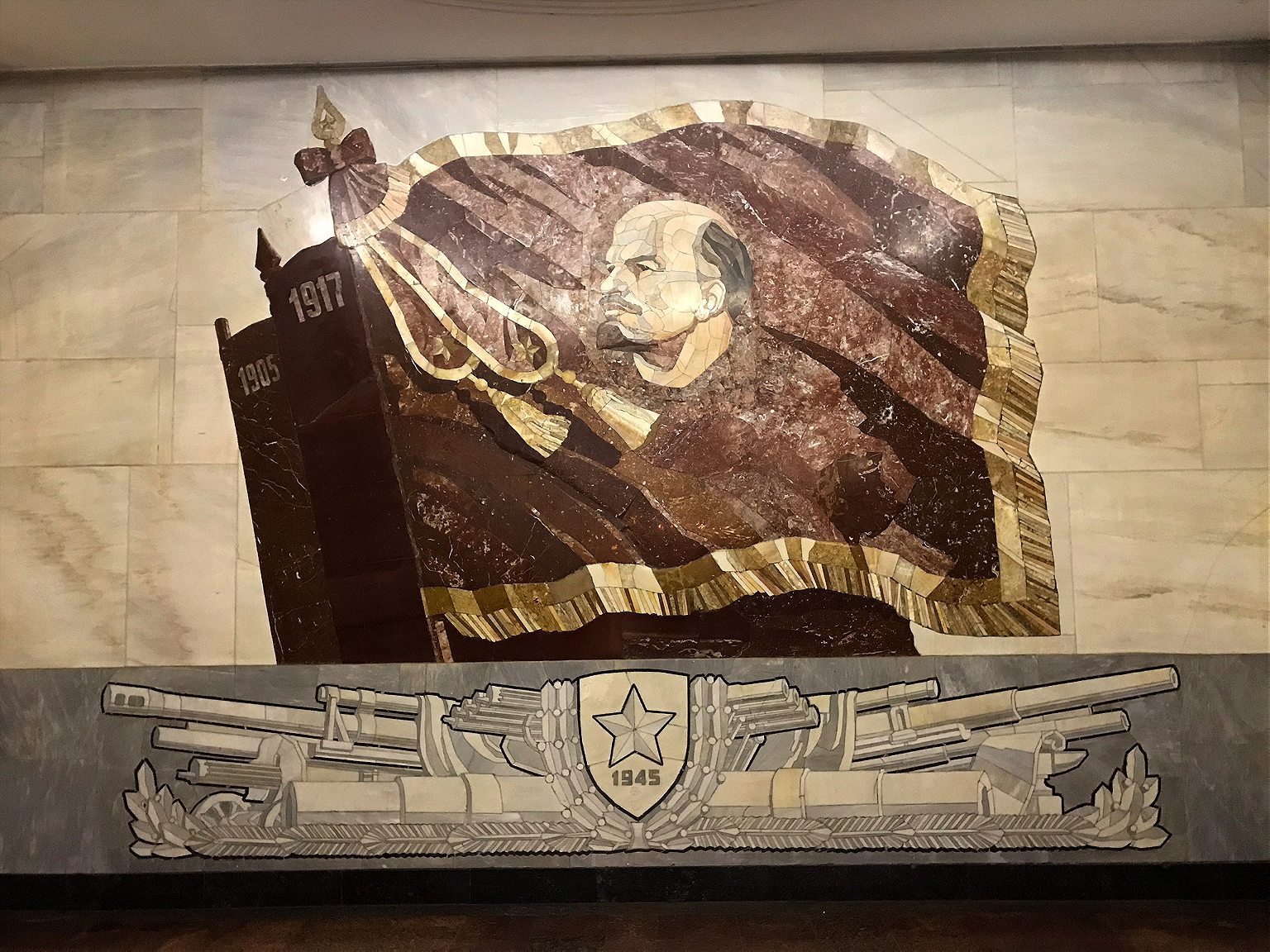
Stay on that train direction one more east to:
6. Elektrozavodskaya. As you may have guessed from the name, this station is the Metro’s tribute to all thing electrical, built in 1944 and named after a nearby lightbulb factory. It has marble bas-relief sculptures of important figures in electrical engineering, and others illustrating the Soviet Union’s war-time struggles at home. The ceiling’s recurring rows of circular lamps give the station’s main tunnel a comforting glow, and a pleasing visual effect.
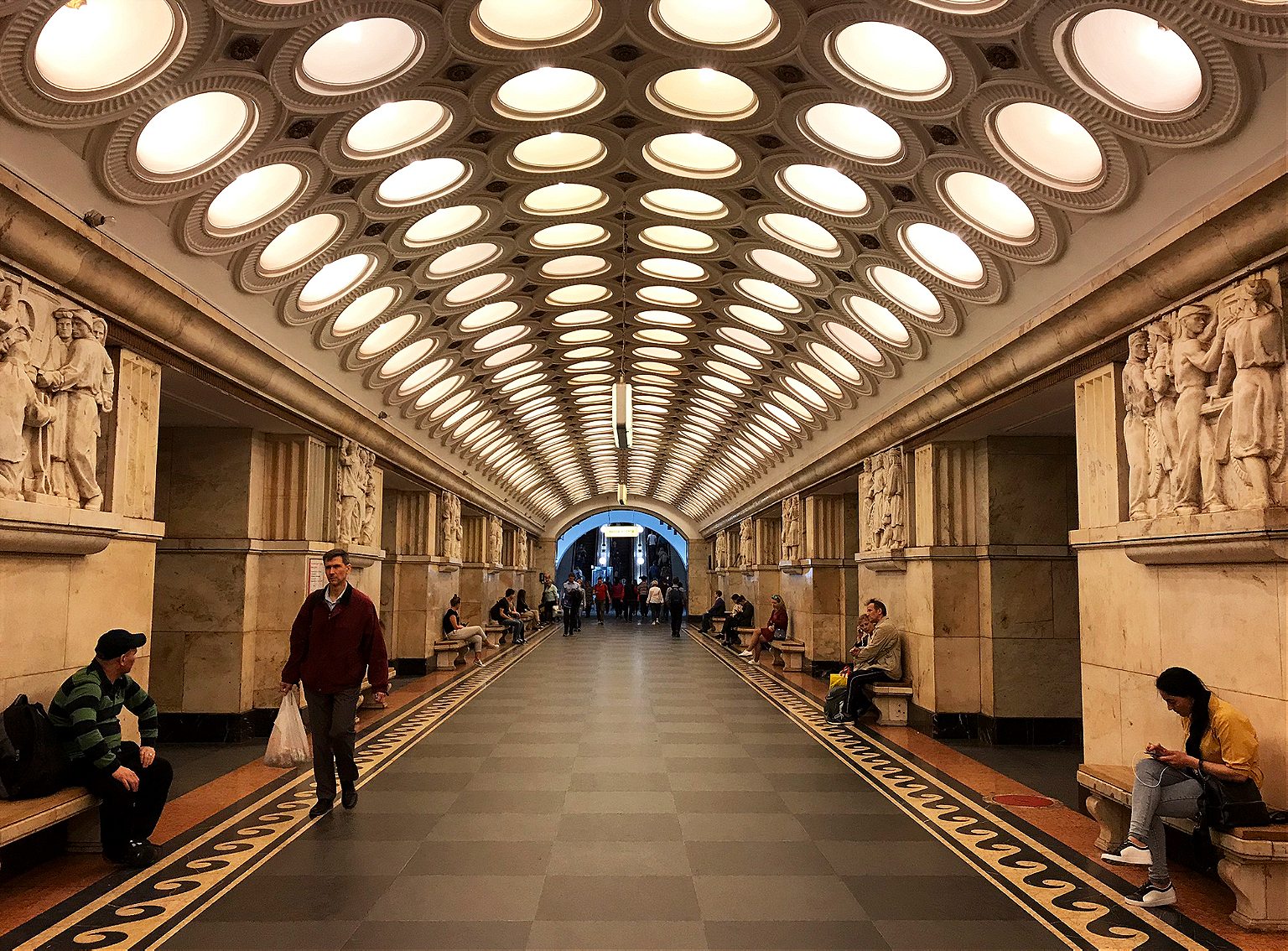
Double back two stops to Kurskaya station , and change back to the 1/Circle line. Sit tight for six stations to:
7. Kiyevskaya. This was the last station on the Circle line to be built, in 1954, completed under Nikita Khrushchev’ s guidance, as a tribute to his homeland, Ukraine. Its three large station halls feature images celebrating Ukraine’s contributions to the Soviet Union and Russo-Ukrainian unity, depicting musicians, textile-working, soldiers, farmers. (One hall has frescoes, one mosaics, and the third murals.) Shortly after it was completed, Khrushchev condemned the architectural excesses and unnecessary luxury of the Stalin era, which ushered in an epoch of more austere Metro stations. According to the legend at least, he timed the policy in part to ensure no Metro station built after could outshine Kiyevskaya.
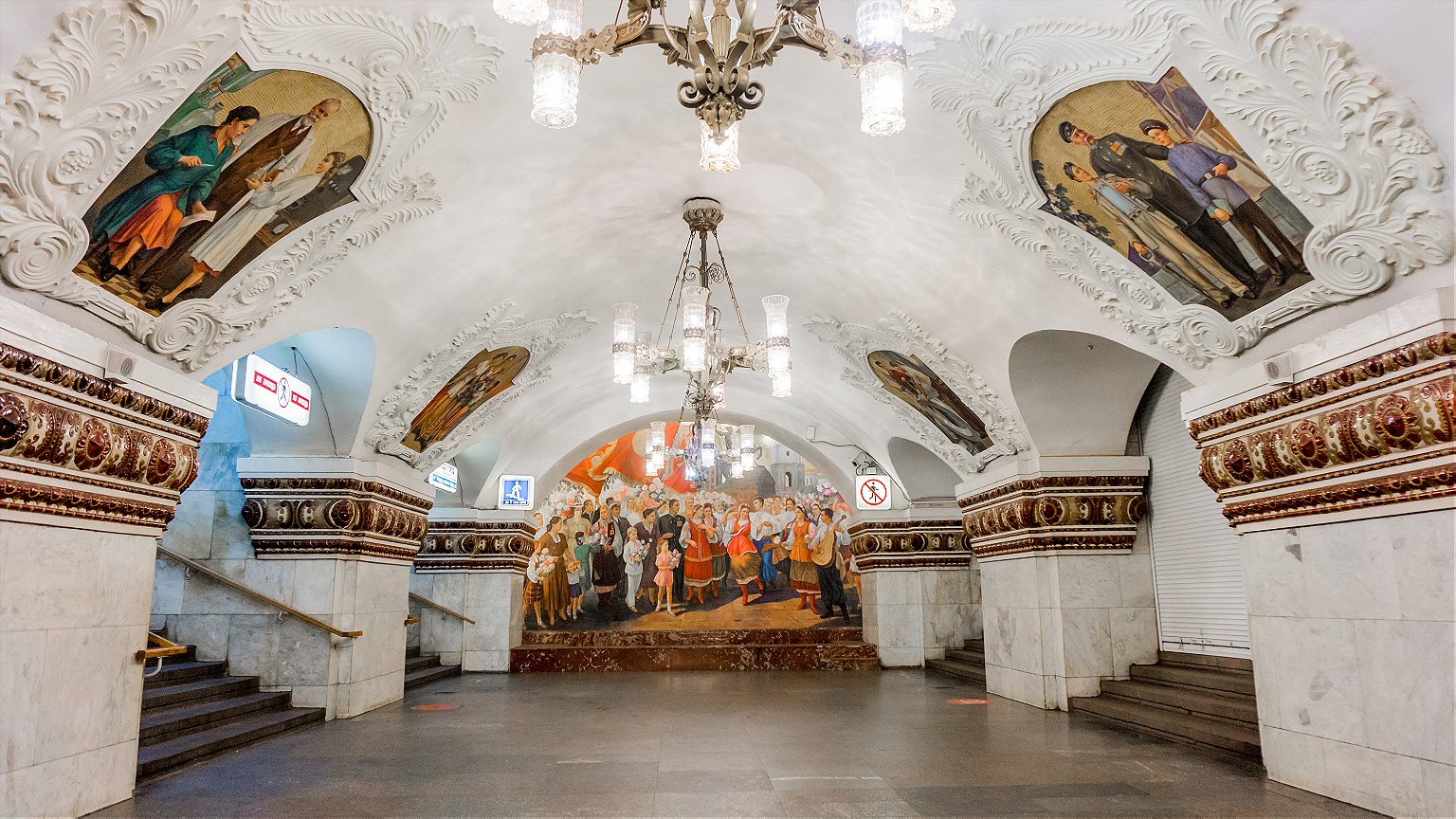
Change to the 3/Blue line and go one stop west.
8. Park Pobedy. This is the deepest station on the Metro, with one of the world’s longest escalators, at 413 feet. If you stand still, the escalator ride to the surface takes about three minutes .) Opened in 2003 at Victory Park, the station celebrates two of Russia’s great military victories. Each end has a mural by Georgian artist Zurab Tsereteli, who also designed the “ Good Defeats Evil ” statue at the UN headquarters in New York. One mural depicts the Russian generals’ victory over the French in 1812 and the other, the German surrender of 1945. The latter is particularly striking; equal parts dramatic, triumphant, and gruesome. To the side, Red Army soldiers trample Nazi flags, and if you look closely there’s some blood spatter among the detail. Still, the biggest impressions here are the marble shine of the chessboard floor pattern and the pleasingly geometric effect if you view from one end to the other.
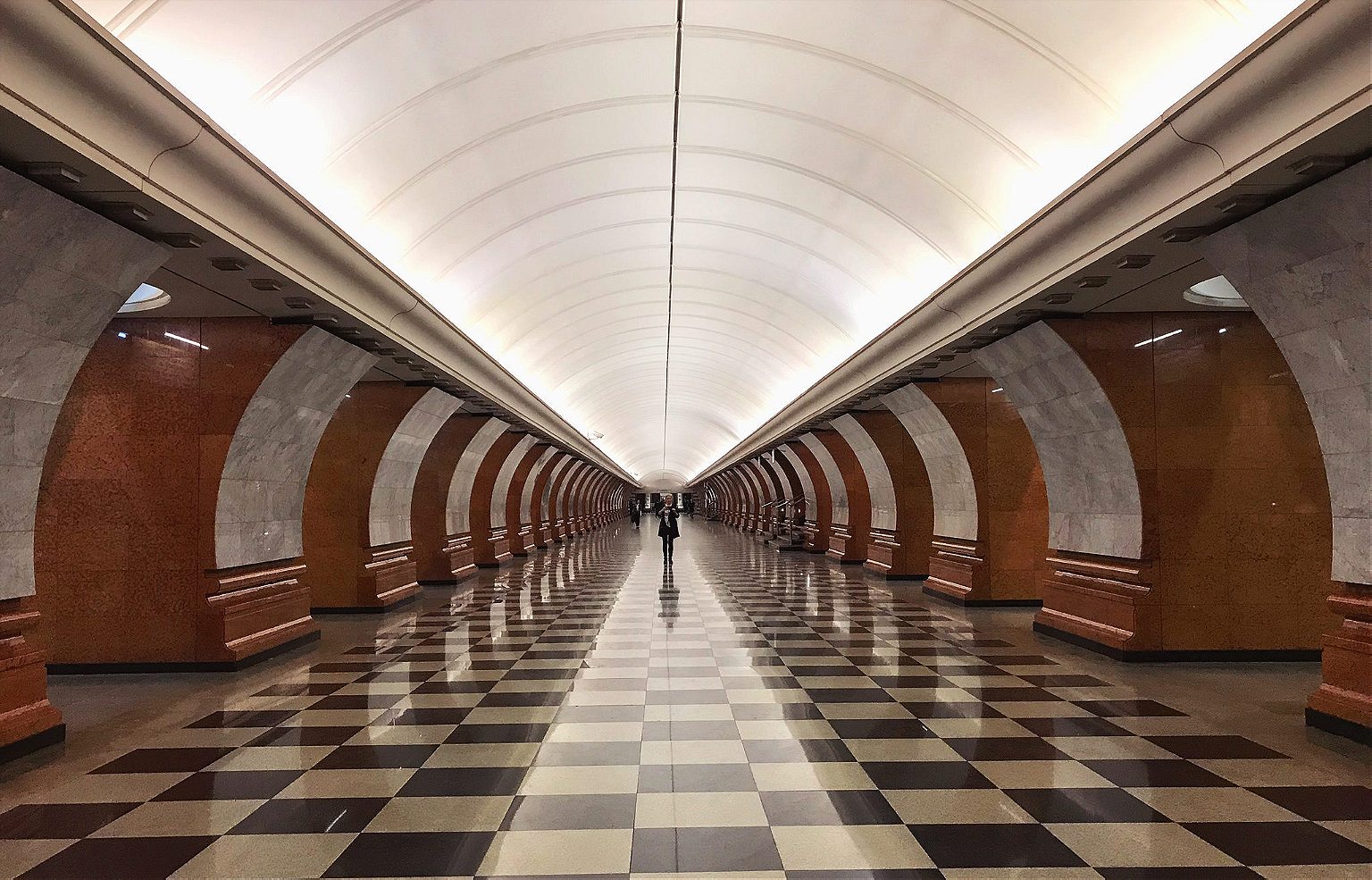
Keep going one more stop west to:
9. Slavyansky Bulvar. One of the Metro’s youngest stations, it opened in 2008. With far higher ceilings than many other stations—which tend to have covered central tunnels on the platforms—it has an “open-air” feel (or as close to it as you can get, one hundred feet under). It’s an homage to French architect Hector Guimard, he of the Art Nouveau entrances for the Paris M é tro, and that’s precisely what this looks like: A Moscow homage to the Paris M é tro, with an additional forest theme. A Cyrillic twist on Guimard’s Metro-style lettering over the benches, furnished with t rees and branch motifs, including creeping vines as towering lamp-posts.
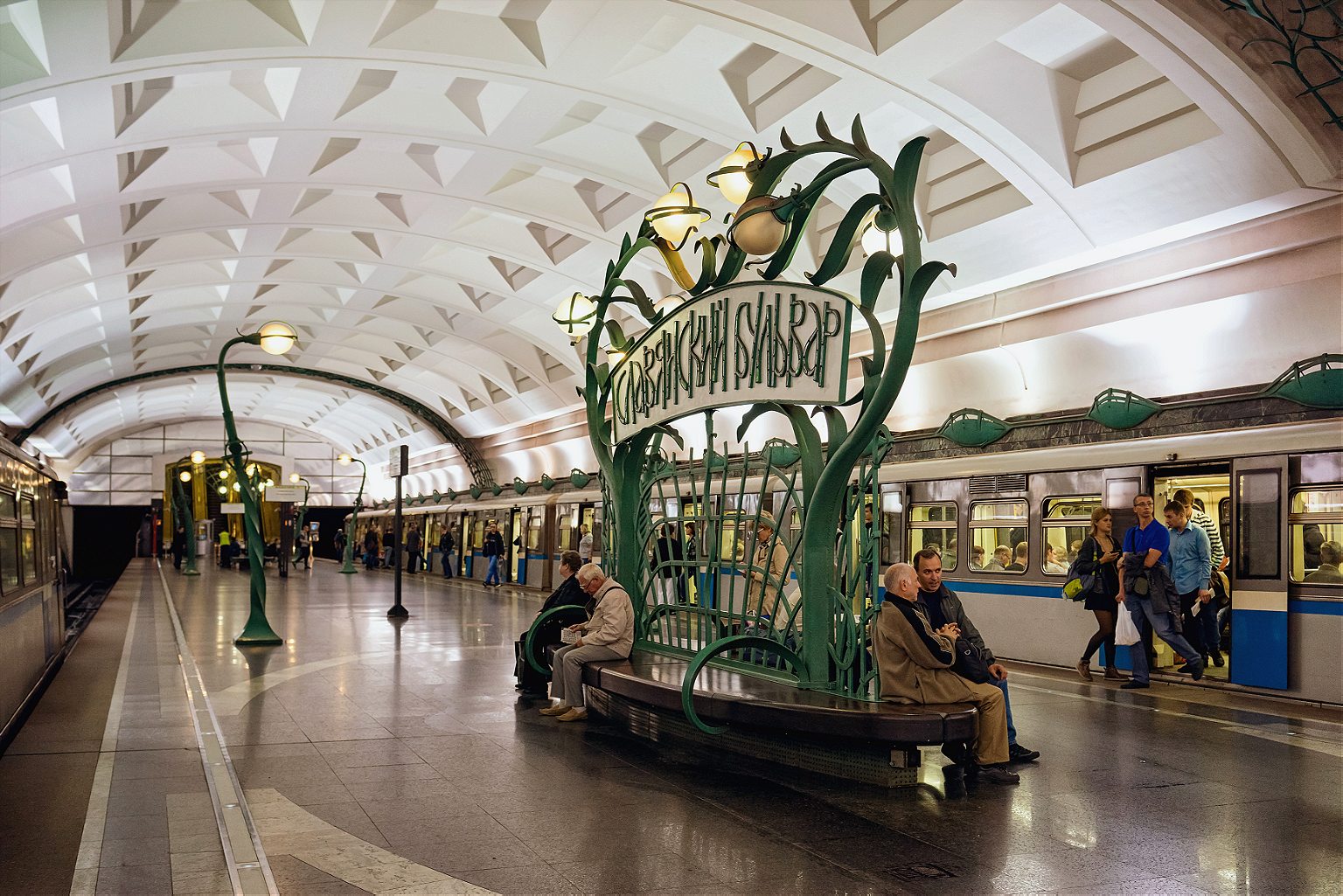
Stay on the 3/Blue line and double back four stations to:
10. Arbatskaya. Its first iteration, Arbatskaya-Smolenskaya station, was damaged by German bombs in 1941. It was rebuilt in 1953, and designed to double as a bomb shelter in the event of nuclear war, although unusually for stations built in the post-war phase, this one doesn’t have a war theme. It may also be one of the system’s most elegant: Baroque, but toned down a little, with red marble floors and white ceilings with gilded bronze c handeliers.
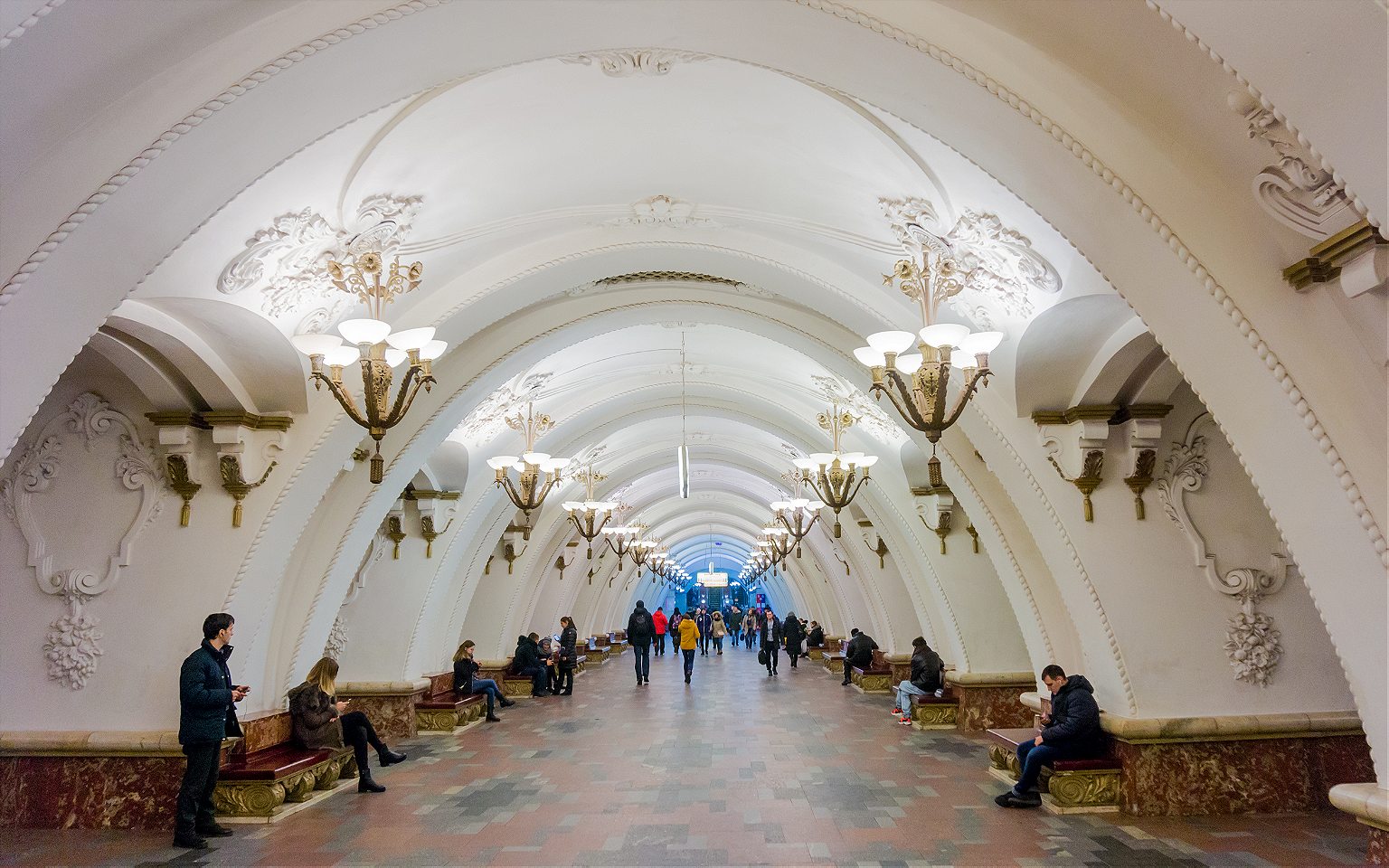
Jump back on the 3/Blue line in the same direction and take it one more stop:
11. Ploshchad Revolyutsii (Revolution Square). Opened in 1938, and serving Red Square and the Kremlin . Its renowned central hall has marble columns flanked by 76 bronze statues of Soviet heroes: soldiers, students, farmers, athletes, writers, parents. Some of these statues’ appendages have a yellow sheen from decades of Moscow’s commuters rubbing them for good luck. Among the most popular for a superstitious walk-by rub: the snout of a frontier guard’s dog, a soldier’s gun (where the touch of millions of human hands have tapered the gun barrel into a fine, pointy blade), a baby’s foot, and a woman’s knee. (A brass rooster also sports the telltale gold sheen, though I am told that rubbing the rooster is thought to bring bad luck. )
Now take the escalator up, and get some fresh air.
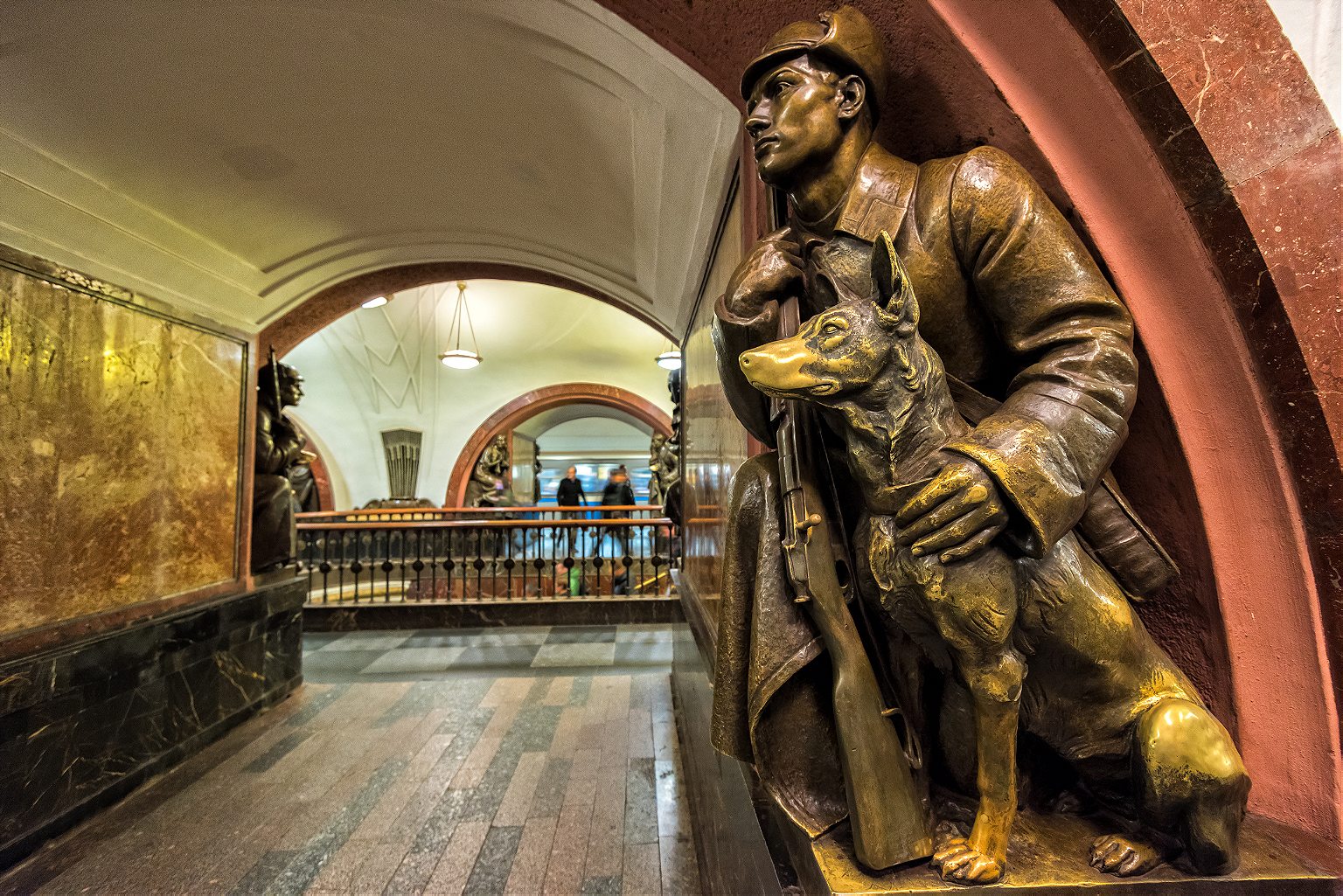
R&K Insider
Join our newsletter to get exclusives on where our correspondents travel, what they eat, where they stay. Free to sign up.
21 Things to Know Before You Go to Moscow
Featured city guides.
UCLA Express
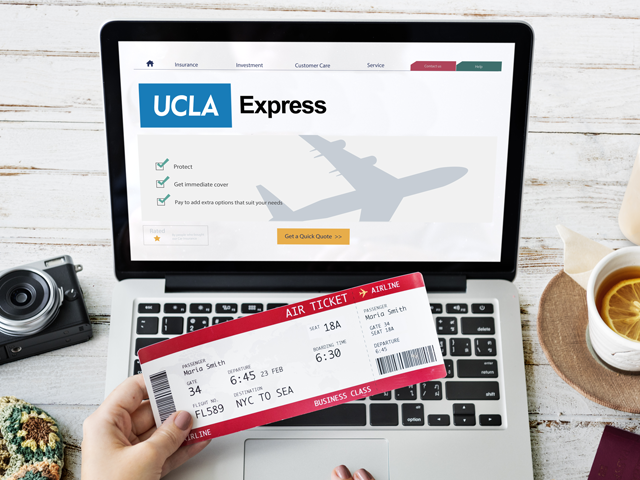
Latest Updates
Express email notifications and reminders are sent to the email address listed as the Work Email for the employee in the campus directory . If your email appears as “ notavailableinconcur.ucla.edu ” in Express or if you want to change your Express email, please contact your Department Directory Coordinator to request that they update your Work Email . After, Department Directory Coordinator update your work email in the online directory it will take ‘up to 72 hours’ to update in Express . More information, including a list of Directory Coordinators can be found in the Update Directory Listing section of the campus directory.
Please Note:
Employees cannot update the Business Email through UCPath self-service, this must be done through the Directory Coordinator.
The field called ‘ E - mail ’ in the Campus D irectory is recorded as the Business Email next day in UCPath.
Email addresses marked as Campus Email within the UCPath System are not used for the Express System .
Express emails will be sent from an @concursolutions.com domain. Please ensure your spam/junk mail settings are updated to allow these as a safe sender.
Notifications sent from: [email protected]
Reminders sent from: [email protected]
Users can change the email notifications they receive under their Profile Settings > Expense Preferences and/or Request Preferences . There are different email notifications based on whether it is an expense report or a request.
If an employee has given permission for a delegate to receive emails on their behalf, the delegate will be copied on all email notifications and reminders. Users can change their delegate’s email permissions under Profile Settings > Expense Delegates .
Supervisors are copied on certain email reminders; this setting cannot be changed. Express email notifications and reminders are sent to the email address listed as the Business Email for the employee in UCPath. If your email appears as “ notavailableinconcur.ucla.edu ” in Express, please contact your department HR to request that they update your Business Email in UCPath. Employees cannot update their Business Email through UCPath self-service. Note: Campus Email addresses from UCPath are not used for Express.
Express emails will be sent from an @concursolutions.com domain. Please ensure your spam/junk mail settings are updated to allow these email addresses as safe senders: [email protected] [email protected]
Travel & Entertainment Card
Use of the Travel & Entertainment (T&E) Card is limited to business travel and event expenses that will be paid directly from the University to US Bank via expense report. The T&E Card should not be used for other types of business expenses and should never be used for personal charges of any kind.
All T&E Card transactions must now be accounted for in the new Express. A cardholder can no longer use the T&E Card, pay US Bank directly (out of pocket), then remove the transaction like they could in the legacy Express.
To account for a T&E Card transaction that the cardholder personally paid to the bank, the transaction must be attached to an expense report and assigned to the “Personal Expense” expense type. Selecting Personal Expense indicates that no payment should be made from the University to US Bank. Selecting Personal Expense for a T&E Card transaction does not necessarily mean that the expense was not for business, but it accounts for the transaction without sending a payment to the bank.
Please note that an expense report cannot be submitted if the only line items on the report are all Personal Expenses (the user will see a red “Action Required” exception message). Personal Expense transactions should be attached to a report in a timely manner, but the report should be held until there are other valid business expenses ready to submit. The Personal Expenses would be combined on the same expense report as the next available business expenses. The trip/event for the next valid business expenses is what the header information (purpose, destination, justification, date range) should be updated to. Be advised that the cardholder (and any delegates who have permission to receive their emails) will continue to receive periodic email reminders until this is resolved by submitting a valid report.
Direct Billed Airfare
Airfare and UCTC service fee charges that are paid via direct billing are also now reconciled via Express. Users will see these company card transactions along with their T&E Card transactions when completing an expense report. To account for these direct bill charges, the company card transaction(s) must be added to an expense report and an approved request must be linked. The transactions can be added to the report as soon as they are available, but the report should not be submitted until after completion of the trip. Any out of pocket or T&E Card transactions should included on the same report, to provide a full accounting of the trip or event.
Please refer to the Quick Reference Guides for detailed Instructions on how to create a report from a request and how to attach company card transactions.
Create a Report from a Request QRG
Add University Card Transactions to an Expense Report QRG
The UC Travel Center (UCTC) will advise you if your ticket may qualify for a refund. Refunds are not guaranteed, and airlines may change their refund policy at any time without notification.
If your ticket may qualify for a refund, you will need to create a Request to cover the applicable airline and UCTC service fees.
Specific instructions for how to format a refund request are available here:
Create Request for a Ticket Refund
Learn Express
Getting Started
Planning & Booking Travel
During a Trip
After a Trip
Guest Reimbursements
Concur Mobile App
Resources & FAQs
a General User
an Approver
a Dean/Executive
© 2024 Regents of the University of California
- Accessibility
- Report Misconduct
- Privacy & Terms of Use
Opinion | Susan Shelley: How will the U.S. Supreme Court…
Share this:.
- Click to share on Facebook (Opens in new window)
- Click to share on Twitter (Opens in new window)
- Click to share on Reddit (Opens in new window)
- Click to print (Opens in new window)
- Opinion Columns
- Guest Commentary
- Letters to the Editor
- Editorial Board
- Endorsements
Opinion | Susan Shelley: How will the U.S. Supreme Court handle Grants Pass v. Johnson?

Last Monday, the question of when and if cities may enforce an anti-camping ordinance finally came before the U.S. Supreme Court.
It has been a long wait.
The smallest details of homelessness policy in California and other western states have been under the control of the Ninth Circuit Court of Appeals since April 2006, when the American Civil Liberties Union won a lawsuit against the city of Los Angeles. The decision in Jones v. Los Angeles was “historic,” the ACLU said, and “ends the criminalization of homelessness.”
“The Eighth Amendment prohibits the city from punishing involuntary sitting, lying or sleeping on public sidewalks that is an unavoidable consequence of being human and homeless without shelter in the city of Los Angeles,” wrote Judge Kim M. Wardlaw, as she halted enforcement of the L.A. ordinance.
The city could have appealed the ruling to the U.S. Supreme Court in 2006, but instead chose to settle with the ACLU. Los Angeles agreed to allow overnight camping on the sidewalks anywhere in the city until 1,250 units of housing were built for the chronically homeless, and in exchange, the Ninth Circuit’s decision in the case would be vacated and would not be a precedent in the future.
Here’s how that worked out: L.A. built the required housing but never resumed enforcement, and the Ninth Circuit issued a ruling in 2018 that repeated all the reasoning from the Jones case, essentially making it a precedent anyway.
That case was Martin v. Boise. A three-judge panel of the Ninth Circuit held that cities could not enforce an anti-camping ordinance unless they had sufficient shelter beds available for everyone.
The city of Boise petitioned for rehearing by the full court, but in April 2019, the petition was denied. Dissenting from the denial, Judge Milan Smith wrote that the ruling by the three-judge panel “badly misconstrued” Supreme Court precedent, had already “begun wreaking havoc on local governments, residents and businesses throughout our circuit” and “shackles the hands of public officials trying to redress the serious societal concern of homelessness.” Judge Smith even included a photograph of Los Angeles, showing tent encampments on the sidewalks. Five other judges on the appeals court joined his dissent.
Boise appealed to the U.S. Supreme Court, but in December 2019 the justices declined to hear the case.
You’ve seen what happened after that. Encampments proliferated, tens of billions of public dollars were spent and the problem of homelessness only grew worse. Meanwhile, cities were sued again and again for trying to enforce basic health and safety laws.
One of those cities was Grants Pass, Oregon. The town tried to enforce an anti-camping ordinance and was stopped by a U.S. district court and then by a (divided) panel of the Ninth Circuit. Grants Pass appealed to the Supreme Court. In January, the justices agreed to hear the case and decide this question: “Does the enforcement of generally applicable laws regulating camping on public property constitute ‘cruel and unusual punishment’ prohibited by the Eighth Amendment?”
At the root of the conflict is the 1962 Supreme Court decision in Robinson v. California. In that case, the justices said a law that made it a crime to be a drug addict, even if the person was not using drugs at the time of arrest, was an unconstitutional violation of the Eighth Amendment’s ban on ‘cruel and unusual punishment’ because it punished someone’s status, not their conduct.
The landmark Robinson case was also the first time the court said the “cruel and unusual punishment” clause of the Eighth Amendment applied to the states, instead of exclusively to the federal government.
“You are not asking us to overturn Robinson, correct?” Justice Sonia Sotomayor asked the attorney for Grants Pass during Monday’s arguments. The attorney responded that it was their position that “Robinson was wrongly decided and should not be extended,” but that the Court did not need to overrule it to decide this case.
Much of the argument on Monday was a dispute over the difference between status and conduct, and whether homelessness was a status, like being a drug addict, or conduct, like using drugs. Was the city criminalizing a status when it prohibited the conduct of camping in a park?
There was also an extended dispute over the definition of available shelter. Is there an Eighth Amendment right to a shelter bed within the city limits? Is there an Eighth Amendment right to a shelter that will accept a Rottweiler?
That’s a question that has been raised often by dissenting justices over the last hundred years as the court gradually asserted control over state and local policy decisions by applying the Bill of Rights, piece by piece, to the states. The justices did this by declaring certain rights to be so “fundamental” to liberty that they are guaranteed by the Fourteenth Amendment, which says the states may not “deprive any person of life, liberty or property, without due process of law.”
Having decided that a right is “fundamental,” the court then made case-by-case decisions on whether a state or local jurisdiction had a “compelling” reason to infringe the “fundamental” right, and whether the law was “narrowly tailored” to accomplish a permissible purpose.
This is how the federal courts got into the business of superintending the smallest details of state and local policy on homelessness and countless other issues.
Now we’ll see if they can get out of it.
Write [email protected] and follow her on Twitter @Susan_Shelley
- Newsroom Guidelines
- Report an Error
More in Opinion

Opinion | California should legalize psychedelics but learn from mistakes in marijuana regulation

SUBSCRIBER ONLY
Opinion | epa short-circuits the u.s. power grid.

Opinion | You are living in an epistemic bubble

Opinion | Larry Wilson: Spy vs. Spy: Why no spy will ever cop to it
- Share full article
Advertisement
Supported by
Guest Essay
I Thought the Bragg Case Against Trump Was a Legal Embarrassment. Now I Think It’s a Historic Mistake.

By Jed Handelsman Shugerman
Mr. Shugerman is a law professor at Boston University.
About a year ago, when Alvin Bragg, the Manhattan district attorney, indicted former President Donald Trump, I was critical of the case and called it an embarrassment. I thought an array of legal problems would and should lead to long delays in federal courts.
After listening to Monday’s opening statement by prosecutors, I still think the district attorney has made a historic mistake. Their vague allegation about “a criminal scheme to corrupt the 2016 presidential election” has me more concerned than ever about their unprecedented use of state law and their persistent avoidance of specifying an election crime or a valid theory of fraud.
To recap: Mr. Trump is accused in the case of falsifying business records. Those are misdemeanor charges. To elevate it to a criminal case, Mr. Bragg and his team have pointed to potential violations of federal election law and state tax fraud. They also cite state election law, but state statutory definitions of “public office” seem to limit those statutes to state and local races.
Both the misdemeanor and felony charges require that the defendant made the false record with “intent to defraud.” A year ago, I wondered how entirely internal business records (the daily ledger, pay stubs and invoices) could be the basis of any fraud if they are not shared with anyone outside the business. I suggested that the real fraud was Mr. Trump’s filing an (allegedly) false report to the Federal Election Commission, and that only federal prosecutors had jurisdiction over that filing.
A recent conversation with Jeffrey Cohen, a friend, Boston College law professor and former prosecutor, made me think that the case could turn out to be more legitimate than I had originally thought. The reason has to do with those allegedly falsified business records: Most of them were entered in early 2017, generally before Mr. Trump filed his Federal Election Commission report that summer. Mr. Trump may have foreseen an investigation into his campaign, leading to its financial records. He may have falsely recorded these internal records before the F.E.C. filing as consciously part of the same fraud: to create a consistent paper trail and to hide intent to violate federal election laws, or defraud the F.E.C.
In short: It’s not the crime; it’s the cover-up.
Looking at the case in this way might address concerns about state jurisdiction. In this scenario, Mr. Trump arguably intended to deceive state investigators, too. State investigators could find these inconsistencies and alert federal agencies. Prosecutors could argue that New York State agencies have an interest in detecting conspiracies to defraud federal entities; they might also have a plausible answer to significant questions about whether New York State has jurisdiction or whether this stretch of a state business filing law is pre-empted by federal law.
However, this explanation is a novel interpretation with many significant legal problems. And none of the Manhattan district attorney’s filings or today’s opening statement even hint at this approach.
Instead of a theory of defrauding state regulators, Mr. Bragg has adopted a weak theory of “election interference,” and Justice Juan Merchan described the case , in his summary of it during jury selection, as an allegation of falsifying business records “to conceal an agreement with others to unlawfully influence the 2016 election.”
As a reality check: It is legal for a candidate to pay for a nondisclosure agreement. Hush money is unseemly, but it is legal. The election law scholar Richard Hasen rightly observed , “Calling it election interference actually cheapens the term and undermines the deadly serious charges in the real election interference cases.”
In Monday’s opening argument, the prosecutor Matthew Colangelo still evaded specifics about what was illegal about influencing an election, but then he claimed , “It was election fraud, pure and simple.” None of the relevant state or federal statutes refer to filing violations as fraud. Calling it “election fraud” is a legal and strategic mistake, exaggerating the case and setting up the jury with high expectations that the prosecutors cannot meet.
The most accurate description of this criminal case is a federal campaign finance filing violation. Without a federal violation (which the state election statute is tethered to), Mr. Bragg cannot upgrade the misdemeanor counts into felonies. Moreover, it is unclear how this case would even fulfill the misdemeanor requirement of “intent to defraud” without the federal crime.
In stretching jurisdiction and trying a federal crime in state court, the Manhattan district attorney is now pushing untested legal interpretations and applications. I see three red flags raising concerns about selective prosecution upon appeal.
First, I could find no previous case of any state prosecutor relying on the Federal Election Campaign Act either as a direct crime or a predicate crime. Whether state prosecutors have avoided doing so as a matter of law, norms or lack of expertise, this novel attempt is a sign of overreach.
Second, Mr. Trump’s lawyers argued that the New York statute requires that the predicate (underlying) crime must also be a New York crime, not a crime in another jurisdiction. The district attorney responded with judicial precedents only about other criminal statutes, not the statute in this case. In the end, the prosecutors could not cite a single judicial interpretation of this particular statute supporting their use of the statute (a plea deal and a single jury instruction do not count).
Third, no New York precedent has allowed an interpretation of defrauding the general public. Legal experts have noted that such a broad “election interference” theory is unprecedented, and a conviction based on it may not survive a state appeal.
Mr. Trump’s legal team also undercut itself for its decisions in the past year: His lawyers essentially put all of their eggs in the meritless basket of seeking to move the trial to federal court, instead of seeking a federal injunction to stop the trial entirely. If they had raised the issues of selective or vindictive prosecution and a mix of jurisdictional, pre-emption and constitutional claims, they could have delayed the trial past Election Day, even if they lost at each federal stage.
Another reason a federal crime has wound up in state court is that President Biden’s Justice Department bent over backward not to reopen this valid case or appoint a special counsel. Mr. Trump has tried to blame Mr. Biden for this prosecution as the real “election interference.” The Biden administration’s extra restraint belies this allegation and deserves more credit.
Eight years after the alleged crime itself, it is reasonable to ask if this is more about Manhattan politics than New York law. This case should serve as a cautionary tale about broader prosecutorial abuses in America — and promote bipartisan reforms of our partisan prosecutorial system.
Nevertheless, prosecutors should have some latitude to develop their case during trial, and maybe they will be more careful and precise about the underlying crime, fraud and the jurisdictional questions. Mr. Trump has received sufficient notice of the charges, and he can raise his arguments on appeal. One important principle of “ our Federalism ,” in the Supreme Court’s terms, is abstention , that federal courts should generally allow state trials to proceed first and wait to hear challenges later.
This case is still an embarrassment, in terms of prosecutorial ethics and apparent selectivity. Nevertheless, each side should have its day in court. If convicted, Mr. Trump can fight many other days — and perhaps win — in appellate courts. But if Monday’s opening is a preview of exaggerated allegations, imprecise legal theories and persistently unaddressed problems, the prosecutors might not win a conviction at all.
Jed Handelsman Shugerman (@jedshug) is a law professor at Boston University.
The Times is committed to publishing a diversity of letters to the editor. We’d like to hear what you think about this or any of our articles. Here are some tips . And here’s our email: [email protected] .
Follow the New York Times Opinion section on Facebook , Instagram , TikTok , WhatsApp , X and Threads .

IMAGES
COMMENTS
Name updates can take up to 72 hours to show in Concur. If you need to book a flight before your Concur profile has been updated DO NOT BOOK ONLINE, call the UC Travel Center at (310) 206-2639 or email [email protected].
Here are the latest reimbursement rates for UCLA employees who are traveling on business or hosting an entertainment function where meals and light refreshments are part of doing business: Mileage Reimbursement Rate Use of private vehicle for University business travel Expenses incurred on or after January 1, 2023: 65.5 cents per mile
10920 Wilshire Blvd., 5th Floor Los Angeles, CA 90024-6541 Mail Code: 143348 Phone: (310) 206-2639 or (800) 235-UCLA (8252) CST# 2046415-70. Travel Services Directory
UCLA Travel Arrangements UCLA Travel. Phone: (310) 206-2639, (800) 235-UCLA (8252) Email: [email protected] ... Per LVO Policy 741, $1,000 is the reimbursement limit for purchases, other than travel, working meetings, & conference registrations. Foreign Travel.
Access to the new UCLA Travel Guidelines issued by the Chancellor's Office. Recently, a set of guidelines for business travel and entertainment was sent to UCLA Deans and Executives after we received a number of requests from our faculty and staff for additional guidance on travel policies and expenses. We now want to make sure that all departments have access to these guidelines.
10920 Wilshire Blvd., 5th Floor Los Angeles, CA 90024-6541 Mail Code: 143348 Phone: (310) 206-2639 or (800) 235-UCLA (8252) CST# 2046415-70. Travel Services Directory
Per University Policy, UCLA's Travel Accounting must process travel reimbursement within 45 days of trip completion, or it will be treated as imputed income and taxable. ... The amount the traveler actually paid while on University business and is subject to a limit for each full day on travel status.
For those working a hybrid FlexWork schedule, daily discounted parking is an excellent option if you come to campus fewer than 15 times a month. Since campus parking demand may differ from before the pandemic, UCLA Transportation can't guarantee that all parking lot and structure requests will be approved. • UCLA Parking Rates and Fees
Staff in Travel Accounting, the Director of Travel Services, and the Associate Vice Chancellor/Controller are available to offer guidance about specific situations and requests. Manager of Travel Accounting: Frank Mark-Kossow. [email protected]. 310‐825-9947. Senior Director of Corporate Financial Services: Scott Monatlik.
UCLA Travel Accounting Response Times (Travel Reimbursements): It generally takes UCLA Travel Accounting 8-12 weeks to process payments on all orders and reimbursements. Please plan events and notify your vendors well in advance to avoid penalties or disallowances.
claims the $64 daily limit 1) Must travel for at least 24 hours OR 2) If total travel time is less than 24 hours, an overnight stay supported by a lodging receipt is required Based on actual costs but not to exceed $64/day Lodging, Meals, & Incidentals (International) Refer to www.travel.ucla.edu for daily allowable reimbursement amounts
AFTER THAT: Airfare can be paid in advance by contacting the UCLA Travel Center at: [310] 206-2639 or [800] 235-UCLA [8252] Please Press: "2" for NEW reservations Flights and "3" for existing reservations. Office Hours are: Monday - Friday - 8 am
UCLA has negotiated preferred rates with various airlines and international carriers. Rates are extended only to UCLA business travelers and must be booked through the UCLA Travel center via phone, reservation request form, or email: UCLA Travel Center (310) 206-2639, [email protected] . If you would like to use your contract or grant ...
Overview. Trip registration is required for those traveling on official University business off-campus (>100 miles) or internationally. Accurate information on travel plans is needed in order to deliver the services and protections the travel insurance policy offers. University travelers include employees, medical residents, students, fellows ...
a. The UC Travel Center's Direct Billing System should be used for airline tickets purchased for Business Travel. Use of the Direct Billing System eliminates the need for the Traveler to pay out of pocket and then be reimbursed. b. UCLA will only pay for or reimburse economy fares (See Policy BFB-G-28, pg. 17 for allowable exceptions).
Students should call the Ashe Center Infection Control Line at 310-206-6217 and faculty and staff should call their health care providers. Please always call ahead before arriving. We encourage you to visit the COVID-19 information page on UCLA Newsroom, which is frequently updated with the latest guidance and resources.
UCLA medical student Kendra Arriaga-Castellanos is becoming a doctor who empowers ... While it felt stressful and challenging at times, it ultimately proved she could exceed the limits she'd once held for herself. ... "The people who help push the specialty forward travel to different countries and return home with insight and knowledge to ...
Southwest Airlines said it will limit hiring and suspend operations at four airports in the U.S. and Mexico following a loss of profits and delays getting planes from Boeing.. In a release posted ...
1: Off-kilter genius at Delicatessen: Brain pâté with kefir butter and young radishes served mezze-style, and the caviar and tartare pizza. Head for Food City. You might think that calling Food City (Фуд Сити), an agriculture depot on the outskirts of Moscow, a "city" would be some kind of hyperbole. It is not.
Why visit Moscow? Majestic churches, impressive historic fortresses, and palatial buildings: Moscow is a fascinating city whose emblematic architecture reflects the turbulent history that has defined Russia throughout the centuries. The traces of the USSR can be found around every corner of the city, side by side with the iconic relics of Imperial Russia, like the mythical Red Square, the ...
A violent tornado was seen plowing through an area east of the city limits of Lincoln, Nebraska, kicking up debris in the air. CNN meteorologist Chad Myers reports.
Oblivious UCLA protesters call for 'intifada,' decry 'genocide' but can't define either, video shows "The school has done its best to ignore us and not tell us what happens next ...
Just avoid rush hour. The Metro is stunning andprovides an unrivaled insight into the city's psyche, past and present, but it also happens to be the best way to get around. Moscow has Uber, and the Russian version called Yandex Taxi,butalso some nasty traffic. Metro trains come around every 90 seconds or so, at a more than 99 percent on-time ...
If you need to book a flight before your Concur profile has been updated DO NOT BOOK ONLINE, call the UC Travel Center at (310) 206-2639 or email [email protected]. Minor Express System Update In preparation for Concur Expansion efforts, minor Express system updates were moved to production on March 22, 2023.
Last Monday, the question of when and if cities may enforce an anti-camping ordinance finally came before the U.S. Supreme Court. It has been a long wait. The smallest details of homelessness ...
Southwest Airlines announced Thursday it will stop serving four airports after reporting increased losses in the first quarter and more delays in the delivery of promised jets from Boeing.
Individual mainland Chinese tourists were allowed to travel to the island in 2011, with the number of cities allowing for individual visits gradually expanding to 47 as of 2015.
Mr. Shugerman is a law professor at Boston University. About a year ago, when Alvin Bragg, the Manhattan district attorney, indicted former President Donald Trump, I was critical of the case and ...